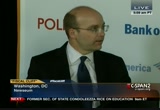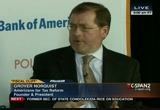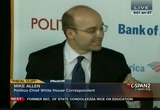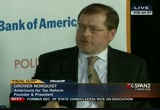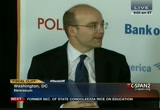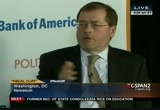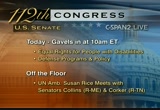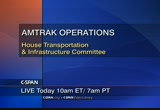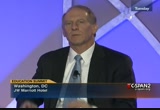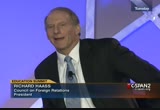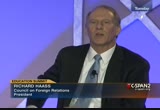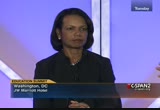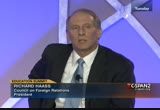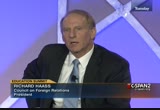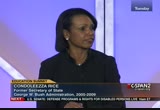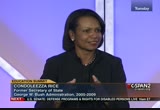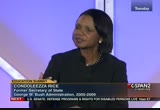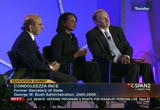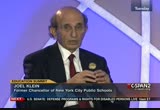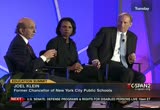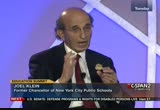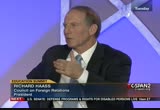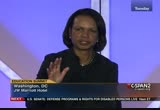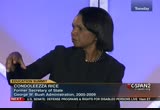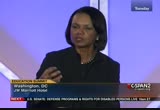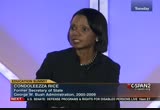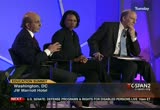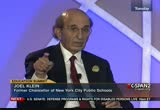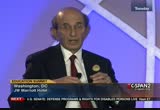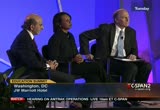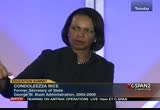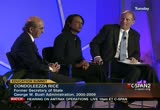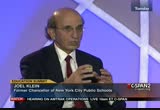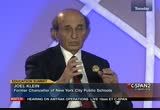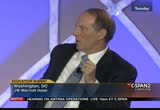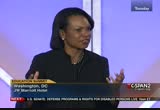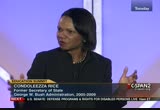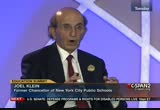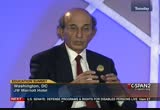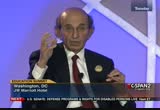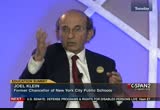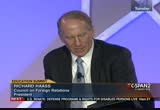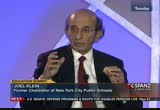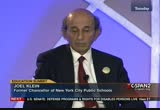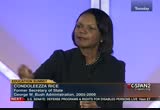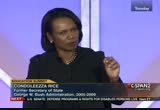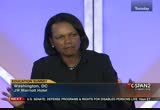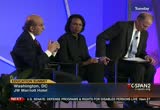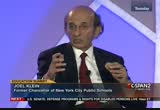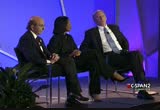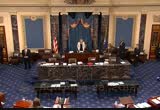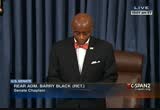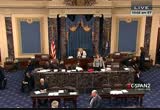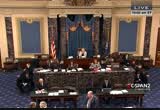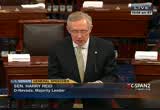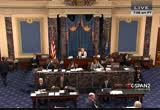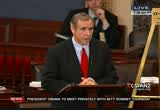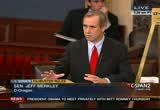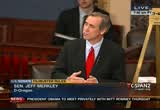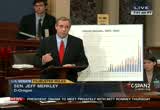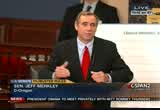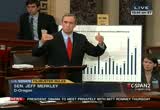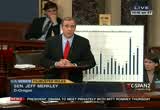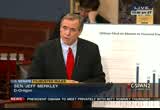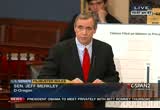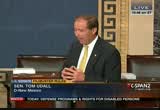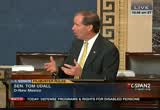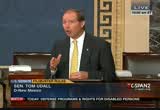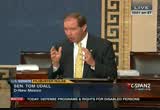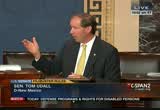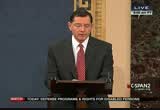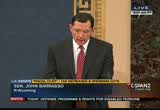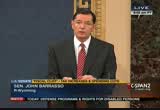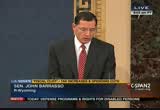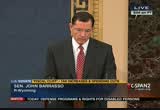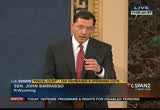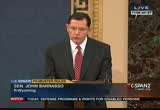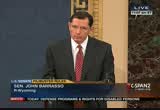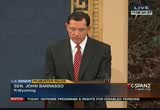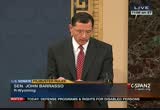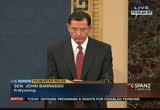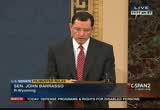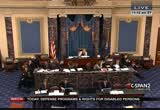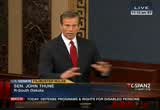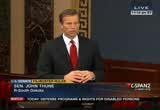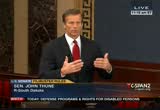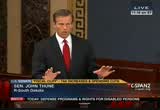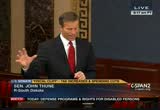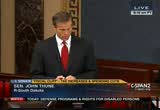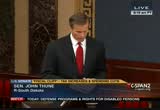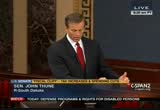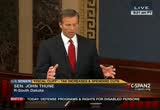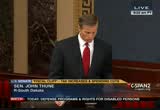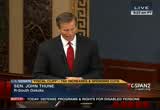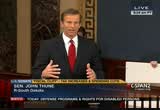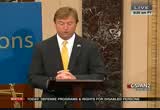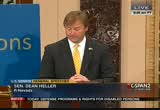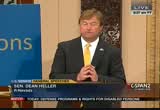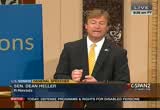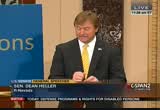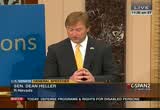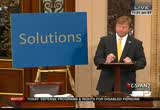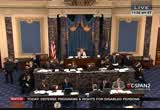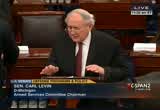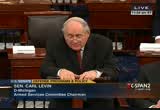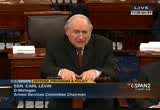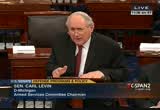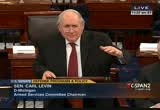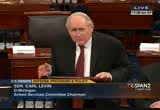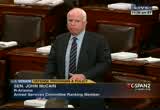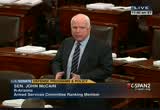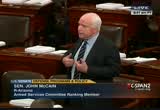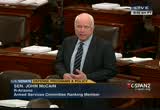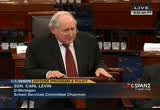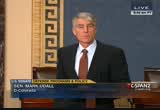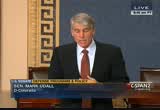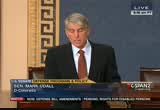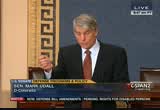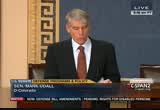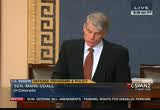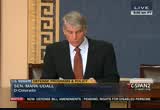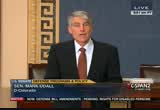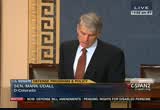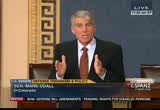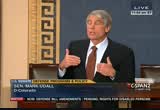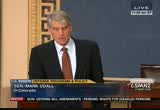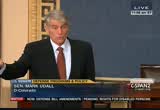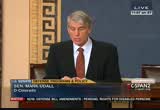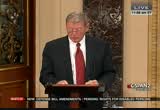tv U.S. Senate CSPAN November 28, 2012 9:00am-12:00pm EST
9:00 am
>> debates controlled by the republican party. raising $100,000. >> or, it's not riffraff. you could argue well, ron paul wasn't really running for president. he was running to build the libertarian movement within the republican party. but he could have brought the resources to the table as part. los.
9:01 am
oel kline, get rid of the department of energy. one government, 100,000 kids in arizona will now have $5,000 voucher, public school or private school or home school. if they don't spend it -- you don't need more money. given the post office, your letters arrive sooner or would allow fedex or ups to deliver mail to make the post office mail different. >> we are really getting that. one more question. when you leave here very shortly, you go to a wednesday
9:02 am
meeting, a liberal meeting of the right wing -- this is a weekly meeting you have had -- >> some of the people are from there. >> this is a weekly meeting of what you call a center-right coalition. you have several meetings, 60 of them around the country. this is a place where congress, people from think takes toward generally agree get together, 150 people, sometimes 20 of them will speak. what you going to tell them? what is your message? >> the reason people come to my meeting is i don't tell me things. if i talk, everybody gets -- 33 people attempt and we will overtime be candid. field kinks and activist groups, running the republican study coming to talk about what to do,
9:03 am
very brief presentations. everybody in the movement, what everybody else is doing. we will have special guests, before the movie came on, became state for an hour and talk about why he thought we should cut down the economy. our friend, not warren buffett but the other guy. a great conversation, ralph nader has been by. years ago -- >> what did he learn from his -- >> did me a favor of not bothering me with his problems which was great that spin too much time trying to make money. >> a useful friends with him? >> i never said anything about
9:04 am
him. >> as we go, you have an unusual hobby. you, something unusual. >> i have a collection of backers. also have a collection of airsickness bags. one thing i do ask people who come to the meeting, very helpful if you are traveling, you have an airsickness bag which the free present government afghanistan air sickness bag, so it is a great collection and somebody mentioned years ago in a profile starting in an e-mail, this is -- and odd quirky thing i did. >> what is the mood at the meeting going to be?
9:05 am
>> people are very optimistic. people were disappointed because we didn't have the house senate president and then people thought we were going to get the president in the senate and stock didn't go up. we elected a house stronger than the last one. the president got elected to four years, lost two seat in the senate but would you rather have 60 or 15 or more than 40? more than 40, enough to filibuster, not enough to pass something which is where we were before. the disappointment was we didn't take the senate. when you look two years ahead there's every reason to think -- half of what we do focus on the states and as you mentioned we had 48 states and two meetings, 90 people get together -- >> in the morning --
9:06 am
>> no time for one and it is not work. we didn't have people who won the house in 2010, what do we do now? >> not going to top that. >> floating is not working. >> thank you, appreciate it. we appreciate vote politicos who made this possible. thank you for coming out, we appreciate it. we have a breakfast next wednesday, bob woodward and senator marco rubio, grover norquist, thank you. [applause] ♪
9:07 am
>> the u.s. senate dabbles in today about an hour from now at 10:00 eastern and today they will continue working on legislation dealing with equal rights for persons with disabilities. majority ritter harry reid hopes the senate to work, 2013 defense program. off of the 4 u.s. ambassador susan rice meet with republican senators discussing the september attack on the consulate in benghazi, libya and she will talk with susan collins and senator bob corker. yesterday she sat down with senator mccain, gramm and ayat. senator mccain told reporters the information she gave the american people was incorrect, but a spontaneous demonstration triggered by hateful video. it was not and there was compelling evidence that the time that was certainly not the case. the house transportation and infrastructure committee is holding at hearing on amtrak's restructuring plans.
9:08 am
the committee will hear from the inspector general and amtrak's president and representative from the united transportation union live at 10:00 eastern on our companion network c-span. [applause] >> last night secretary of state condoleezza rice and chancellor of the new york city public schools joel kline had a somewhat on education reform in washington examining america's education system and the impact on national security. council on foreign relations moderates the discussion, about an hour. >> welcome to this evening, broadcast of morning joe. the energy in this room is a real testament to two things. one is how the education reform
9:09 am
has ripened, a combination of meade, the talent we see in this room has coalesced on the issue of new technologies but there is a sense that the moment has arrived and the other is jeb bush. [applause] >> i am a great believer that two things matter in life. won his ideas and the other is people. that is the real driver of change, the real driver of history. when you unpack it all and jeb bush is a perfect example. the coming together of a person with real talent and drive with a set of ideas and this is one of them. the fact that you are all here is the greatest salute you could give. condoleezza rice and i come out of a national security background. we use to mess around with
9:10 am
something called the rand bond calculator. xbox it used to calculate what was known as the cp, the circular error of probable of the blast effects of nuclear weapons. here we are today, we traveled a considerable distance and the reason is, the other person who comes to mind is mike mullen of the joint chiefs of staff who ask what is the greatest national security threat facing the united states? he didn't say al qaeda, he didn't say iran or north korea or climate change. he said the deficit and the state of american society. that is exactly right. you can look at questions of the budget and questions of infrastructure and immigration policy but above all education policy because this is the future and we are not talking about physical infrastructure but human infrastructure and joel is someone who has
9:11 am
dedicated the most recent phase of his multi phase currier to this and when he is not discovering the best restaurants in brooklyn he is focused on improving a lot of young people in this country. so let me tell you how condi is dedicated to this issue. year-and-a-half i called her up and asked her to do something for me and with me. she said i'm too -- don't even go there. we have bet on many football games. before the end of this conversation you are going to agree to what is going to happen and she said no way. we at the council of foreign relations spend our time working on things like china, mexico, all the judicial foreign policy issues and we've moved our
9:12 am
agenda and increasingly focusing on things domestic and what we want to do is a report on education. we don't want to repeat what everyone else has done but look at education through the prism and filter of national security and ask the question what is the relationship between the challenges of k-12 education and national security of the united states? it didn't turn out to be a terribly hard sell. she knew i had her at that point but didn't take a follow-up phone call. she was there. shea and joel cochaired the task force report, our version of the commission and the whole idea was people with disparate backgrounds, educators and national security and people don't come together in the same space and the essentially say --
9:13 am
raise the question about the relationship between the educational challenges we face and the national security challenges we face, to recast this issue, refrain this issue for a broader -- beyond do over. the fact that you are here reflects the fact that you are here at the risk of being redundant. what we wanted to was that people who read florida affairs rather than the chronicle of higher education and journals like that. what they have done the two of them, helped with the report. it is there and the idea is not to resolve everything but to put the issue center stage. let me turn to them for the
9:14 am
starch and basically say let's deal with the basic question which is, is very close link between -- between k-12 education and the state of american national security. >> thank you very much. the council on foreign relations organization, but a lot of years, was prepared to look at what i will call the domestic sources of american strength because without the strength at home we don't lead abroad. this was insightful account will to do this. i was looking forward to the opportunity to work with joel who i admire so much for what he did in new york city and what he continues to do on education reform and it was a great force
9:15 am
and i would make three brief points about this link we all found between national security and education reform. one that is most evident when you hear the statistics are global competitiveness and that is generally where people go. if you are going to be 17in math and science you will eventually lose the innovation raise. you are not going to be able to educate people to the jobs that are available, those jobs will go elsewhere. our global growth and competitiveness and that in some ways is the most obvious link. we are not preparing people for the work place, the workplace of the twenty-first century, we are not going to longer be the world's most competitive and innovative economy. more surprising for me was brought to us by the former
9:16 am
chief, former secretary of the army who talked about the problems of the education system and the relationships of the armed forces, the inability of fully 70% of americans actually qualify for service in the armed forces ought to be a red flag for anyone. there are other reasons for-obesity, a fair amount of it is people can't pass the basic skills tests. just imagine that. a country developed country, the most powerful country in the world, to get into the military. the analog for that is secretary of state, realizing how few people start to learn foreign languagess in a timely fashion, how many people can actually
9:17 am
find something on a map that is not the united states of america, the fact that we don't have people who are prepared to go into the intelligence agency so we are robbing ourselves of talent in literally the national security infrastructure of the country. but third, and to me most importantly, a tragedy people will not be prepared for good jobs and have nowhere to go, a tragedy that people can serve in the armed forces for the intelligence agency but the united states of america is held together by a great national creed not by ethnicity or blood or religion, our national creed is an aspiration will narrative that it doesn't matter where you came from. it matters where you are going. you can come from homeless circumstances and do great things and the only way that is true is if you have access to a
9:18 am
high-quality education and if it ever becomes the case as it is increasingly now, as i said many times i can look at your zip code and the social fabric of this country has no chance to hold together and we will be picked one against the other and those who are capable and those who are not. those who are employable and those who are not. i can assure you that you might not be able to control your circumstances but you can control your response to your circumstances. that will no longer be the way americans think about themselves or each other and that gives way to entitlements. at core, the real problem for us in national security is not just
9:19 am
our competitiveness abroad, the great national narrative, this cohesion that has made us the country that we are. [applause] >> let me just say people responded that way because the word you just said were the words jeff said this morning, the most important words the country has to here. we went to the presidential race, and we heard it in your speech, those words were not part of the national debate. and the truth that holds the country together call the american dream is likely to become if we don't change course rapidly the american memory. it is a very powerful notion and i give condi a lot of credit.
9:20 am
one eye was chancellor in new york i knew her casually. she said to me this is an education and even economic issue. this is a national security issue and she and richard had the foresight to bring the council there and why that was important was once again most of the people in this room if you didn't get it you wouldn't be here. we are an echo chamber. we talk to each other and feel smug that we understand it but we are not remotely transforming this country. this luncheon discussion, and it'll disparaging because we don't have the time to nibble around the edges. as we speak in america for the first time we are raising a generation less well educated than their parents were at a time we need to raise a generation that is much more well-educated, and educational
9:21 am
outcomes based on zip codes and all too often with race and ethnicity and raising a generation in which there is no great public outcry about this issue. this will decide what kind of nation -- the other one is to worry about the fiscal cliff and it is a very important issue. to resolve that issue? today in the third grade it seems n.y. chicago and detroit, kids of being condemned to a life that is going to be very humbling and very frustrating because i know for effect those kids are not going to be able to read, they are not going to be able to compete and they will not be able to make up in some miraculous way in the twelfth grade. so having this twist of focusing on national security may lead the country to understand if we don't get off of the path we are on we are on a path to a very different kind of america and the person who deserves enormous
9:22 am
credit for driving this task force is secretary rice. [applause] >> let's talk about what it would take to close the gap between where we are and where we ought to be. one way to think of it is basic skills. one thing we decided the council on foreign relations is a large issue of content. what got me to this point is when i talked at the kennedy school, non american students knew more about american civics and the basis of american foreign policy than americans do. more non americans had read the federalists and the american. that was one thing that caught me up. the other was an experience where i spent time with the young men graduating stanford in computer science and started
9:23 am
asking him what he studied beyond computer issues and i was shocked he could graduate from this amazing university where condi teaches without one economics course or one history course. that led us to start producing at the council on curriculum material. we will be producing simulations and modules and so forth that high school and colleges can use to close this gap between what it is kids know and what they need to know in order to be ready for this world that like it or not is going to fundamentally affect their lives. what is your sense for both of you because you come from an educational background and condi from national security background, what is your sense of what priorities need to be to fix the problem? >> i come from a national
9:24 am
security background and stanford for six years. seeing the product of the education gives me a perspective on what it is we need to try to achieve in that period of time and obviously at stanford you see the very best but i will tell you two thing is. number one, if you have low expectations of even the best they will live down to them. [applause] >> i come at this with the belief the most important thing is whatever you are teaching you have to have very high standards. i am not much in the self-esteem movement. every kid gets a trophy. [applause] >> i am a musician myself and i think the arts are important but
9:25 am
how many of these little performances have you been to where kids are running all over the stage, they think it is accused but it is not and they don't practice and it would be better if they know something. so my first point is high standards whatever you teach them. secondarily, i do believe that the common corps which we talked about in the report has a chance to give us some grounding in not just substantive knowledge but the ways of acquiring and said. i believe in s.t.e.m., i want them to be able to write. that is a very undervalued skill these days. it would be very useful if indeed some civics education
9:26 am
were included but the most important thing is whatever we are going to do we need to fix the to it in a common way. for a country and i mean the united states of america, some sense of what is going to require in skill level. it doesn't mean we don't have local control, the state is the place. and highly mobile labor pool. california and texas in vermont have to have some sense, some
9:27 am
common basis of knowledge. the national governors' association, a local initiative, i hope we have more discussion how to make certain implements. >> when you talk about self-esteem, working in the united kingdom. a kenna-12 system goes to the heart of it. the deep belief we need to develop a kid at self-esteem so she can perform. we need to reverse that and tell people they need to perform in order to have self-esteem. it is critically important, elevating standards is important. three things have the potential
9:28 am
they are not easy to achieve, but could change the system. if i could wave a wand tomorrow i would make a-12 teachers america's heroes. they would be the profession we all aspire to. they would be seen in places like japan where they call teachers since reflecting what they call lawyers, doctors, university professors, the difference between we view university professors in america and the way we view k-12 teachers and places like finland have this right and we haven't 100% wrong. we decided to trade unionize rather than professionalize and seniority is more important than excellence and when you do that what you end up with is a race to the bottom and that is what we have created. given where we are, i agree with the comment that choice is critical. is a fundamental backbone of the report. it was not unanimous but with
9:29 am
enormous support from locks, no one in this room would voluntarily agree to send your kid randomly to a school in d.c.. understand what i said. no one in this room would send your kid randomly to school in d.c.. you would move, go to private school, pull strings, not just say i am down with that. . kids go to those schools. in new york we have an acronym. other people's children. as long as we send other people's children to schools we won't send our kids to shame on us. the way out of that is a choice. the way out of that is choice. [applause] >> we should insist on it for other people. k-12, post secondary, lot of problems in post secondary. when people go to america to look at post secondary schools, nobody comes here to look at our k-closest and there's a reason for that. post secondary are not
9:30 am
guaranteed areas, they're not a monopoly provider and in the absence of competition we will continue to hobble along. the third thing is something joel and others for a long time, i've learned about from the first time when i was chancellor, stop trying to fix a broken system, create a new and effective system and we have got to rely on technology like everybody else does to empower our teachers and engage our students and change the service delivery process. to me those things are critical issues. >> let's -- [applause] ..
9:31 am
>> i would hope that, look, to be quite blunt at first like to make sure they can sting english and write in it. because too many of our kids can't do that. but one question is whether there is some way to spread the task of some of the things that are kids need to learn. we may not be able to do everything in the school they, in the school. i've been very active with the boys and girls clubs, and betsy mentioned we started something called a center for new generation out in palo alto in redwood city. it's a high quality, very --
9:32 am
afterschool and summer program for kids three hours after school. and there they get languages and their they get instrumental music and they get some of the things that maybe can't be fit into a school day because as jewel reminded me, we have the shortest learning day and the shortest learning year in the developed world. i that we're going to be able to extend the learning day in most places. so perhaps finding other alternatives. you know, i learned to speak french at actually learned it at age nine, but not in the schools. i learned it because believe it or not, my father who was a presbyterian minister, decided with my mother that all educated children should speak french. so on tuesdays, thursdays and saturdays we were dragged down to the church to take french with the french teacher from high school. so there may be some ways to add
9:33 am
to the curriculum outside of the schools. >> hang around with condi, one thing i've learned, i want to come back, the son of a presbyterian minister. i just really -- i have been so shortchanged in life. [laughter] >> a jolt was at hebrew school tuesdays, thursdays, saturdays. >> what good is it? [laughter] >> by now i would be playing again, speaking french. but i want to just make -- when you first called me about this you said something constructive, not just in for mine which is a global history. we live in such a different world. by and large are clueless about this. not just a language thing. these kids you're talking about who know more about the constitution. also know all hell of a lot more about middle east and china than our kids know. if you came to the average high
9:34 am
school in new york city and asked kids about what's happening in the world, i think it would take your breath away. i really do. i've watched -- in terms of civic education in the united states, and this is really a serious problem. so i think that's one part of it. the second part, and why i think technology can matter, is because we don't have to limit the school day anymore. to the hours inside the school run. there's much more we can do. i've watched some folks here from -- a bad brand but it's a great school in sweden and i've been there to visit him. and they've managed to creating portal, and i met a kid at school, whose mother was a nurse and had one day a week to take the kid with her so she couldn't be at school but she could work on the internet in that time. jeff who was one of my heroes had a big idea, and that is he
9:35 am
said, look, how can we be, we are the only profession that admits we're failing what we're doing for kids. we all go home at 3:00. there's got to be a way to think differently about the dimensions. i think technology is part of the problem. but i want to go back to where condi started because as important as music and art and as important as global history and so forth, kids who can't read, can't we. kitty kitty basic mathematics are not kids are going to master global history or do higher order or critical thinking. so we've got to figure out both how to build the foundation and then build on the foundation. right now tragically we're doing neither. >> you begin by pointing out the fact that many measures of the united states versus other countries, we are falling behind, 30, 50 years ago we ranks a lot higher than we are on basic skills such. what is it others are doing it, or what can we learn?
9:36 am
what is it we can learn, and if you will, from others? >> well, let me -- just a cautionary note on the importation idea. i think one thing that we clearly can learn is joel's point about teachers. the way that the profession is treated, the people who go into the profession, the training that people get in the profession, look, i was provost of the university that has a very high ranking education school. but i think there are real problems with schools of education, and away the teachers are trained, and so -- [applause] one thing that we can look is how the profession is treated in other places. obviously, i think the standards issue is a major one. one thing that i learn on the task force, kids in korea are learning in grade three what our kids are learning in grade five.
9:37 am
why should that be the case? there's no reason for that. and so we obviously are not having high enough standard to the reason i say there's a caveat, there is undoubtedly a lot we can learn from others. but we are not shine and we are not -- we are not finland. we are a big diverse, federal, very complicated country. and so one question that we asked is, what can we learn from herself in other parts of the education system that are more successful? joel brought up tertiary, both secondary. the university in this country universities and colleges across the board are the gold standard for international. what do they have that the k-12 system does not have? number one, they have competition. [applause] and that's what i'm also a major advocate of school choice. and secondly, they have variety. it's not one size fits all.
9:38 am
you can go to a community college, small liberal arts college, a research university. they have brought it. so one of the things we tried to do in the task force is to say, what are some of the forces of americans influence in other areas that can be imported into the k-12 education system? and i think that for me confirmed that the monopolistic tendency in the k-12 education system may be the biggest problem. so i think there are things we can learn from others, but there's also an awful lot we can learn from ourselves in other areas of american life that are more successful. >> talent he made his point time and again. it was so impactful in terms of the task force. think about this. two things that give people hope about our country. you said to believe or want to believe at least that marriage matters most but that is not where you came from, your people are, or which is accomplished
9:39 am
through your hardware, through the application of your talents, the challenges you face. and the second thing is, the dynamism and innovation, no place in the world that innovates like america does. look at our school system. merit is irrelevant to the question, and innovation, you don't even hear about. someone asked me what it's about in education, i says it's hard to tell. there hasn't been any in such a long time, we couldn't even capture it. so if you think about the dynamism and the merit, if we infuse those in our k-12 system, and that goes to the ed schools which in finland, whatever the comparison is, think about this. for every 10 people who apply, except one. in america for everyone who applies they take 10. [laughter] they insist, what kate walsh and people are doing -- it's true. what they're doing is really important. but how is it to you, if we're going to fix this problem with got to transform a system that doesn't leave and merit and
9:40 am
choose innovation to one that has dynamism that is the hope of the future of this country, and it will be the hope of the future of our education. >> let me give you an example. the last thing i did before i left the public school system in new york, and think about this, is i was with somebody who was president at ibm and who's a friend of my come and i said you been a good friend but truthfully you haven't been enough for our schools. he said what would you like me to do? i'd like to create a school, take a two-year community college, mix it with a four-year high school, and train people to be technicians. people select the school. at the end of six years, if they get out of the school they get their associates degree, and you, ibm, certificate them in technology. and if they meet your criteria, you hire them. and sam, to his great credit, agree to do this.
9:41 am
we opened the school in new york city a year ago, and people are lined up around the block to get into it. it is such an exciting -- everybody said you can't miss community college -- why can't you mix community college with k-12? because the bureaucrats worship at different churches so you can't mix them. [applause] what kind of ways that you think what you can't bring the business people into certificate because only the educators can certificate? what the hell with the education about certificate and people in technology? we managed to do. the guy i -- what did you do? you just gave bloomberg is great school. pretty so i thought you were my friend. he said all right, i will give you one. to his great credit he said none of the he said, give me five. they did five of them in chicago. but if you think about it, why can't we open this thing up to the different states? we do this cookie-cutter thing as this all these kids are the
9:42 am
same. someone was asking, what's the difference between college and career m.e.d.i.c. west everybody on the panel, i could see them look like, dear in headlights but nobody wants to answer that question. one way to think about that question is why don't we create the kind of meaningful career and vocational opportunities for kids so that if applicable skills that are valuable in the market. not everybody in my view is going to a four-year liberal arts and that's not in mock four-year liberal arts. i think their valuable. we can create a system in which people who have different career paths and giveaways to go. what we can't do is simply abandoned kids which is what we are now doing in k-12. [applause] >> i'm going to ask a few people here to improve the quality of the questions. and we're going to begin with hannah who was the secretary
9:43 am
designate of new mexico for the public education department. >> good evening. started the conversation tonight with -- [inaudible] we put a lot of ideas on the table. if you had to articulate your number one idea that changes education and, therefore, national security and our economy and our nation, what would it be? if we don't deliver on that, what do we look like in 20 years? >> you know, task force, hannah, had choice but and i think that's because we are where we are. people have pointed out other countries have none choice k-12 systems that work. but i think for me personally if you look around the country now, to places that are worth looking very hard at. one is new orleans because it was in some respects a natural process after katrina where they could start over again.
9:44 am
and while there's a lot of room for improvement of great things are happening. the other places harlem where i think there's now more choice in that little neighborhood. and if you look at the results, it's amazing. about a third of the kids in harlem in the third grade are in charter schools. but what's amazing is the harlem district went up, an and this is apples to apples, went up dramatically from when we started this intensive choice process there. now, it was something like 28 out of 32 district. now it's about 16th. and not only did the charter schools outperform almost everybody, but the public schools which were 28th actually moved up significantly themselves. so i think those are two situations of models that we should develop your i think what, down in new orleans between the reform and relinquishing, and portfolio i think are really important ideas
9:45 am
that need developing. so that's were i would comment. >> i would agree that choice, and for two reasons. the catalytic effect on the system if you will, because going to get from a tertiary system, if they college isn't getting applicants, it will either go out of business or it will do something to start to get applicants. so there's a catalytic effect on the underperformers of having people be able to make choices with their kids. and especially for poor parents. someone said on the task force, we can have an opt out provision. we have an opt out system. as joel said, that's what houses are expensive in palo alto and fairfax county because people often with those systems or they vote with their feet to private school. so the only people -- our poor people and that's a high-tech in equality and that's why i've called it a civil rights issue. those people make choices, but it will have them an affect on individual child or kids would
9:46 am
be better educated, and i think you'll have a catalytic effect on the system. so i would also say school choice. [applause] >> i would only add standards. it's important we as a society said very clear expectations, for what it is we want. the secretary of state -- as a member of the cabinet, secretary of state for education in the united kingdom where i got educated. so i look inward -- i look forward to hearing your questions. >> thank you very much. i just want to say, it's been an absolute pleasure to hear you. it was worth traveling coach on united. [laughter] >> the ultimate compliment. >> to hear you speak. >> the first time i've ever worried about -- [laughter]
9:47 am
>> but you made the point that you're changing things and they also matter -- [inaudible] one of the reasons that america won the cold war is that it recognize this is a moral conflict much than anything else. and america realized that to win the cold war and couldn't win on -- [inaudible] it still have the scandals of segregation part. but winning the civil rights battle was a precondition of winning fight of liberty. now, i think looking from the outside, that there is the same danger now. when i go to china and i criticize them for their lack of democracy, they say yes, we are educating all our people. you are not educating all yours in britain and america. then when i talk to people who are on the edge of radicalism, they say look at the protest and injustice in your british and
9:48 am
european and american regions. we would never allow that of an islamic state. now, there are versions of the truth. nevertheless, they have power. and i wanted to what extent american political breeder lead- [inaudible] provide the moral leaders at the world needs. and then when people hide behind the arguments of states' rights and they say we don't want core, standards because we need to protect our states' rights. one of the things it reminds me of is the argument in the 1960 about people is that it's a states' rights but in the particular, i think this was conservative, it worries me that people don't accept, as you said, this is the civil rights challenge of the time. if you're a poor citizen in
9:49 am
mississippi, and damascus states' rights there is no choice, no diversity and now loyalty. almost all of the schools are bad schools i in the state. almost all of the children -- [inaudible] so surely, surely the party and the democrats can get together and say we need to solve the civil rights battle now in order to ensure that americans can lead again. [applause] >> first of all, i'm awfully glad you made the trip, because speed i will pay for you to go business-class. [laughter] >> i couldn't agree more, and, indeed, the united states, i believe that the greatest force of our leadership abroad is not our military although we have a wonderful militant or even at her economic strength although obviously we have tremendous economic strength, but it is
9:50 am
this great american creed that resonates around the world. that you can come up on circumstances you can do great things. that has led people to come here for generations from all over to be a part of that, which is why we have been the best at mobilizing humans potential from all over the world, through immigration. but it's not just mobilizing individuals from abroad. is mobilizing humans from all segments in all classes of america so that you are not trapped in your circumstances. education was a way out but i will just tell a very brief story because it's my own family's story. i am third generation college-educated. why is that? that's because john wesley rights senior, my grandfather on my fathers side when is a young young man in utah, alabama, decide who's going to get a college education so he asked out a colored man could go to college, 1919. they told him about little
9:51 am
stillman college 30 miles away. saved up his cotton, went off to stillman college, pay for his first year, second you comes along and they say well, how are you going to pay for your second your? he says about of cotton. he says you're out of luck. he said how are they going to college? he said they have what's called a scholarship. if you want to be a presbyterian minister you can have a scholarship, to. [laughter] and my granddaddy said that's exactly what i had in mind. [applause] and our family, our family has been college educated, and by what presbyterian, ever since. [laughter] he knew coming is somehow about that transforming power of education. but the wonderful part of that story is, that out of utah, alabama, sharecroppers fund into generations to secretary of state, his granddaughter. [applause] america -- whatever people have
9:52 am
thought of our policies around the world, whatever people thought about us in any other way, that story resonates. and if that's no longer true in the united states of america, then we will not lead because we won't have the moral fiber we need. >> i agree with this. but i would just say one thing. i think it's in one sense, as simple as america's leadership in the world is, i think the consequences are even greater for this country. when we have a country in which there's virtually no social mobility come if you look at the kids from the bottom quarter of the economic spectrum and how few of those are going to high quality colleges today, and social mobility is really drastically different, we don't want to get our heads around it. so i don't think it's just in terms of our global leadership. i think we beat ourselves up from the inside. i really believe the question, tom brokaw brought about the greatest generation, people go fight and die for this country
9:53 am
with pride because they believe in exactly what secretary rice is talking about. i think the question for our generation is not whether we fight and died literally, but whether we will fight for an america that believes in the american dream, or whether we allow it to become the american memory. as long as we divide ourselves, what's going to happen is the hot wind out of the middle class. if that happens we will do so. if we lose hope the global consequences are almost -- will almost pale in comparison. [applause] >> and again this comes back to the national security case for approving education. it's produce the kind of people we need, the staff, the various government agencies and the military. it is for reasons of competitiveness, it's a reason for citizenship. we're all going to have to vote and make other choices. i think what condi was getting at was really fundamental. foreign policy, to borrow, it's too important to be left to diplomats. and the foreign policy we set by our example is in some ways as
9:54 am
important or more important than any talking point even to any ambassador. you talk about ideas. the battle for ideas continue. over the last five or 10 years, talking about singapore or china that somehow this is the future. well, it's not. one of the ways we will make sure it's not is actually going to be by dealing with the issues that are essential to this conference here today. next person wanted to hear from was from paul past record was in louisiana this date leader of education. spent thank you very much. it's so great to be here because this is the one time of year where i'm surrounded by people who think like i do, that the urgency of now is now. it's not next week, next year, next whatever. the kids are dying for adults to
9:55 am
get their act together. and we are also suffering every day, i believe, and i've got a new life. i walked away from the public service life. i'm not in the aerospace business. >> welcome to the 1%. >> and i'm lucky. i'm very lucky but i'm also -- [inaudible] today i got an e-mail from my technology person who said we have been attacked again. our computers are being hacked. this is many times this year. we do government defense work. people are hacking our system, trying to get our secrets. trying to understand for what our government is trying to do. and the urgency of now to me is, there are millions of jobs that
9:56 am
are available for kids all around this country, in the era of protecting our homeland, whether it's protecting our secrets or fighting on battlefields far away. and the technology arena is so important, we saw in new orleans after katrina. we lost technology, we lost order. we lost law and order. technology is a huge benefit. there are sony people who want to say that kids just can't learn. some kids just can't learn. so i would say and do we really believe kids can't learn? aren't you really opportunities for kids? and isn't our security at stake in other ways other than the battlefield, but in the secrets, and intellectual property of the
9:57 am
united states? and when are we going to connect these dots? whenever going to break this system down? when are we going to blow up the system and this mentality? and i'm just excited because governor bush brings us together once a year to reflect on this, and we get to hear people like you help us understand. so please, help me understand, how do we connect the dots? how do we make this real and how do we bring it to the urgency -- >> let me say a word on this, paul, because you're a man who did precisely that. i don't now how many people in this room know what paul pasternak did in louisiana but you would not have had the school district, not have the results he had. and handed raised a question based on what was said. you talk about ideas and people and you ask about ideas. let me to you, as important as ideas are, there are billions of ideas out there in the hands of week leaders and people who
9:58 am
can't execute to get things done. bad ideas end up on the cutting room floor. and on about people. when i see guys like paul pasternak, and i've been waiting all day to say this and what is it right now, a lot of people talk about might friend tony bennett lost and it's painful for me to because i think he was a true leader would change education. and did sit around and check in with all the pollsters and figure out what the hell he needed to do to get reelected. because unlike most people, he actually thought doing something was more important than perpetuating itself. and i will say -- [applause] i will say that -- no, i mean it. no, i mean it. i just want to answer your question, paul. i would much rather in life have come instead of me, that i was
9:59 am
tony bennett, i did something and i lost, rather than i was most people who were educational leaders who do nothing but to perpetuate themselves. and that's the answer to your question. when we stopped -- we always talk about, all of us here preach it's not about the adults, it's about the kids. the truth of the matter is, too many of us, it's about us, it's about the adults, it's about my job, it's about keeping -- and the answer to question is, when we have the kind of leadership that actually says the essence of leadership is not self perpetuation. the essence of leadership is transforming broken system. and if you happen to be a casualty, your leadership will long endure. that will always be true of guys like tony bennett and you and the others who have taken the fight fearlessly. and i thank you. [applause] >> about five minutes of q&a left in this program. we will leave at this point.
10:00 am
you can see the rest of it in the c-span video library. go to c-span.org. the u.s. senate is about to gavel and, in about 30 seconds. centers expect continue working on legislation dealing with equal rights for persons with disabilities. what geordie leader reid said yesterday he hopes the senate can turn to the 2013th defense programs and policy bill. and now live coverage of the u.s. senate here on c-span2.
10:01 am
the presiding officer: the senate will come to order. the chaplain, dr. barry black, will lead the senate in prayer. the chaplain: let us pray. let us pray. father of all, out of the noisy world, we come to this quiet place of prayer. we depend on your goodness, your mercy and grace. as our lawmakers face the challenges of their calling, inspire them to have a mature faith in your providential leading. lord, fill them with your spirit so that they will acknowledge their dependence on you for every breath they breathe and every creative thought they
10:02 am
think. may today be for them a buildi g block for making america a nation that glorifies you. we pray in your great name, amen. the presiding officer: please join me in reciting the pledge of allegiance to the flag. i pledge allegiance to the flag of the united states of america and to the republic for which it stands, one nation under god, indivisible, with liberty and justice for all. the presiding officer: the clerk will read a communication to the senate.
10:03 am
the clerk: washington, d.c, november 28, 2012. to the senate: under the provisions of rule 1, paragraph 3, of the standing rules of the senate, i hereby appoint the honorable kirsten e. gillibrand, a senator from the state of new york, to perform the duties of the chair. signed: daniel k. inouye, president pro tempore. mr. reid: madam president? the presiding officer: the majority leader smed. mr. reid: i now move to proceed to the d.o.d. authorization bill. the presiding officer: the clerk will report the moas motion to proceed. the clerk: a bill to authorize appropriations for fiscal year 2013 for filth activities of the department of defense and so forth and for other purposes. mr. reid: madam president, the first hour will be equally divided and controlled between the two leaders or their designees, the majority will control the first half, the republicans the final half. we expect to begin consideration of the d.o.d. authorization bill today.
10:04 am
madam president, on april 14, 1945, a very young robert dole lay gravely wounded in the mud of war-torn italian hillside. i'd been hit with shrapnel, whicher twhich tore through hisr and spine. 20 years later after rebuilding his body and political career, the senator gave his maiden speech on the senate floor. his first floor speech in the senate was about the challenges faced each day, even in this, the richest of nations, by people just like robert dole. -- people with stabilities.
10:05 am
stability -- people with disabilities. that's what he spoke b "maybe not exclusion from the front of the bus but perhaps from even climbing aboard the bus." for the next 27 years of his senate career, including 11 years as majority leader, and throughout his years in the private sector, bob dole would remain a vocal advocate of americans with disabilities. since senator dole fought for passage of americans with disabilities act in 1990, barriers have been lifted helping people with disabilities in this country live the full and productive life that they want and deserve. there's no finer example of that extraordinary things that americans can achieve in spite of their disabilities than bob dole's inspiring career. in my mind's eye, i can see senator dole on the senate floor standing straight and tall, slim and articulate, as i indicated yesterday, always with something
10:06 am
funny to say. but what people didn't notice is one arm was inoperative. he always kept in that arm, madam president, a pen -- a pen, so i assume people wouldn't grab his hand or something like that. but it was distinctive that -- that was distinctive robert dole. he was such a force here in the united states senate, and to think that he did it all after having been really blown up in a war. the united states has been a leader in expanding disability rights across the globe and u.s. law has been the gold standard for the rest of the world. but the united states must continue to lead by example. we must dozen more to protect american citizens traveling and work abroad. a treaty ratified by 125 nations would advance those goals. this convention would give us an
10:07 am
opportunity to strengthen our leadership on disability rights around the world, and it's another step toward ensuring all people with a disability in any country are treated with dignity and given the right to achieve to their full potential. ratification of this treaty won't cost the united states taxpayer a single dime. it won't require any changes in our existing law. it has the support of veterans groups and disabilities groups from around the country. it has the strong back of a bipartisan group of senators and leading republicans such as george h.w. bush as well as senator dole. he called me a few days ago to tell me how much he wanted this passed. and like passing the americans with disabilities act, ratifying the treaty is the right thing to do. ralph waldo emerson wrote, "if you would lift me up, you must be on higher ground." if the united states wishes to be a global example of the huge strides that people with disabilities can make when
10:08 am
barriers are removed, we must take the high -- we must take the high ground. i thank senator kerry, senator mccain, senator lugar, durbin, barrasso, coons, tom udall, moran, and many others and especially senator harkin, who is the father of the americans with disabilities act, for leading the way on this issue. with their help, i hope we can quickly ratify this treaty.
10:09 am
mr. mcconnell: madam president? the presiding officer: the republican leader. mr. mcconnell: over the past few weeks americans have rulely started to focus in on the debate we're having in washington about how the two parties can work together to prevent a short-term economic crisis in january and an even bigger january crisis later on. so it may come as a surprise to many to see that with just a few weeks to go before a hard deadline on solving the short-term issue, president obama has decided to hit the road -- hit the road this week to drum up support for his favored approach. it's hard to believe really. i mean, every week he extend spends campaigning for his ideas is a week we're not solving the problem. it is completely counterproductive. the election is over. he won. congratulations. we've got a hard deadline here yohowever and he is he's still t
10:10 am
on the campaign trail kind celebrating. this is a problem. if the president really wants to reach an agreement, he needs to be talking with the members of his own party right here in washington trying to broker an agreement, not out there firing up crowds and giving speeches. he's the only one who can do it, the only one who can bring folks together to broker a consensus solution that can pass a democratic-controlled senate as well as a republican-controlled house. this has been my message for weeks. i reiterated it on monday, and i repeat it again today. there are some important points to keep in mind as well. yesterday i came to the floor to remind folks that we didn't get here by accident. the only reason we're even facing these twin crises right is now because democrats have spent taxpayer money with total abandon over the past four years and done nothing to address the main drivers of the debt. our democratic friends like to
10:11 am
say they can't simply cut our way to prosperity. levering are aside the fact that one is proposing that we do that we can't spend our way to prosperity either. that's exactly what democrats have been trying to do for four years. we've been trying to spend our way to prosperity. it hasn't worked yet and not likely to work in the future. this is not complicated. we're not in this mes mess becae washington taxes too little. we're in this mess because washington spends too much. the american people know that and we're not going to get out of it until democrats get serious about real spending cuts and meaningful -- meaningful entitlement changes. so this morning i'd like to speak in a little more detail about why it is that we need to strengthen and protect these entitlement programs through reforms that match them up with the nation's changing demographics. democrats like to pretend as though they're the great protectors of social security,
10:12 am
medicare, and medicaid. they make solemn pledges all the time about how they won't even entertain a discussion about reform. what they don't say is that ignoring these programs is the surest way to guarantee their collapse. all we're calling for is an honest conversation. we all know these programs are in trouble. let's figure out a solution. when it comes to entitlements, republicans are guided by a simple principle: we don't want americans to age into a system that no longer exists. we do not want americans to age into a system that no longer exists. we want to protect them and to protect people's investment in them. but we can't do it alone. reform is something that can only be done by both parties together. that's the reality. and there's been a scandalous lack of leadership on this issue for years among democrat leaders in washington because they think it's a winner politically.
10:13 am
what i'm saying is that the democrats just won the election. congratulations. turn off the campaign and recognize the opportunity that divided government presents to actually do something to strengthen these programs and protect them for future generations. that's all republicans are asking for. medicare, medicaid, and social security are critical to the economic and health care security of millions of older, lower-income, and disabled americans. we want to make sure they remain viable, not only for today's seniors but for their children and their grandchildren and that they don't consume so large a share of federal spending that we don't have the money to pay for other necessities. and here are the facts: just the facts. longer life spans and federal spending patterns threaten the viability of awful these programs as well as the economic well-being of our country and our children. think about it. the number of americans over the
10:14 am
age of 65 will increase from 40 million in 10 in 2010 to 54 miln tend of this decade and then 72 million a decade after that. americans are living longer, more productive lives. that's great and a testament to modern health care here in the united states. but it creates obvious challenges we need to prepare for. we can't just let seniors age into programs that are no longer able to pay promised benefits. it's not right. yet already medicare and social security are both paying out more benefits than they take in from taxes. medicare and social security paying out more benefits than they take in in taxes now. not some other day, now. the problem is particularly urgent in medicare. which paid out nearly $30 billion more than it took in last year and which is on the road to bankruptcy in about 10
10:15 am
years. 10 years from now, a bankrupt medicare. this isn't alarmism. it's madgmath. it is a fact. the studies come from members of the president's own congress who serve as the medicare trustees in discussing medicare part-a trust fund, the medicare trustees report that expenditures for this program have exceeded income every year since 2008. and projected expenditures continue to do so every year until the fund becomes exhausted in 2024, which isn't that far away. so what do the president's own trustees think we should do about all this? this is from their report. the financial projections in this report, they write, indicate a need for additional steps to address medicare's remaining financial challenges.
10:16 am
consideration of further reforms should occur in the near future. not some other day. now. again, these are the president's own trustees. they are the ones saying we need to do something about the problem. not just me. the medicare trustees. yet, democrats are telling those on the hard left don't worry about it. don't worry about it. they won't do anything to reform and protect these programs. and for some reason these groups all applaud as if this is some kind of an achievement. allowing entitlements to crumble. that's the kind of leadership vacuum we've had on this issue from democrats in washington literally for years. here's a concrete example of what i mean. the medicare modernization act requires medicare trustees to send a funding warning letter whenever medicare begins to rely on the treasury for more than 45% of its financing.
10:17 am
the law then requires the president to submit a plan to congress on how he plans to address the shortfall. the trustees issue their first such warning back in 2007, and they have continued to issue one every year since. president bush submitted his plan. this president has ignored the warnings every year he's been in office. every year. here's another example. in 2010, the director of the nonpartisan congressional budget office warned that -- quote -- "the single greatest threat to budget stability of the federal government is the growth of federal spending on health care." yet, how did president obama and his allies respond to these warnings about overspending on health care? the increased federal spending on health care by $580 billion. that was the response, to increase spending on health care by $580 billion. that was their solution. as for social security, the only
10:18 am
thing we hear from democrats is they don't want to talk about it. don't want to talk about it. why in the world wouldn't they want to talk about the fact that this vital program started spending out more than it took in in 2010 for the first time in nearly 30 years, and that its trustees now estimate that it will keep spending more than it takes in for 75 years unless we strengthen it? but again, it's not just a question of when these programs go broke. it's also about the strain they continue to put on the rest of the federal budget on their way to going broke. look, i understand that when it comes to government spending, those on the hard left have no limiting principle. no limiting principle. they don't think about this stuff. they think every dollar secured is sacrosanct forever and ever, amen. but when you're in charge, when you're the steward of the nation's finances, you don't have that luxury.
10:19 am
you're actually responsible. these are just a few of the ways in which democrats have been slowly undermining the very programs they claim to champion, making it even harder for us to reform and strengthen them in the future. the good news is these challenges are neither unprecedented nor insurmountable. we've done it before. when a president of one party has decided to sit down with leaders of the other party and congress, we have faced up to challenges like these and made the tough choices necessary to resolve them. in 1983, president reagan worked with tip o'neill to reach an agreement that increased the retirement age and laid the groundwork for preserving social security for decades to come. in 1997, medicare faced total insolvency by 2001, president clinton working with a republican congress reached an tpwraeplt that added -- reached an agreement that added decades to the life of the medicare trust fund. we can do this. we can do this. but the president, as i've said,
10:20 am
has to lead. that's the issue. it's that simple. now, madam president, on another matter, we've been having a spirited discussion this week over the plans of the democratic majority to break the rules to change the rules. that's how my friend from nevada repeatedly described it when republicans considered doing something similar several years ago but wisely chose not to. at the end of the following year my friend has -- was poised to become senate majority leader. this was back in 2006. with the experience of having served in the minority in his mind, the majority leader, the soon-to-be majority leader, the senator from nevada, made a commitment to practice the golden rule, as he put it, by running the senate with respect for the rules and for the minority rights the rules protect. unfortunately, he appears to have repudiated that clear commitment. unfortunately, he no longer
10:21 am
recognizes, as senator byrd did, by the way, that the senate was not established to be efficient but to make sure minorities are protected. then my friend recognized that is what the senate is all about. that's what he said back then. now he says the primary consideration is -- quote -- "efficiency." he seeks to minimize concerns about this majoritarian power grab by characterizing the effect as tiny, a minor change, as changing the rules just a little bit. but when one of my new members asked the majority leader if this change occurred, what recourse he would have to ensure he ever got an amendment to the bill, the majority leader kweupd -- quote -- "-- quipped -- quote -- "you can always vote against the bill," in other words my friend from nevada acknowledged if this change occurred, the minority will no longer have any ability to ensure that it and
10:22 am
those whom it represents have a meaningful voice in the legislative process. my new colleague was surprised, but i can't say i was. after all, the majority leader brazenly told senator mccain that -- quote -- "the days of amendments are over." and the record of the democratic leadership of course backs this up. it has engaged in a systematic effort to use and abuse senate procedures to marginalize the voice of the minority in the legislative process. let's review the record. it used to be unprecedented -- let me start over. it used to be unprecedented to use senate rule 14 frequently. this rule allows the majority to bypass committees and write bills behind closed doors. doing so deprives all senators,
10:23 am
republicans and democrats, of the chance to have their committee work actually make any difference. according to the congressional research service, the majority has used this rule to bypass committees nearly 70 times. 70 times. when republicans were last in the majority under senator frist, we used that rule half as often, only 30 times to be specific, which is a much lower rate proportionally speaking. when a bill that has bypassed committee, goes straight to the floor, under the current democratic leadership, there often isn't the opportunity to participate there either. in fact, according to the congressional research service, the current democratic leadership continues to break records there as well. it has blocked senators from both sides of the aisle from offering amendments on the floor 68 times. 68 times. that's a conservative figure in which the majority has simply made it impossible for any senators to offer any amendments on the floor.
10:24 am
for if the democratic leadership indicates that it won't let us offer any amendments to a bill and in response we don't allow the majority to get on the bill, then there is no tree to fill that shows up in the statistics, but there is a filibuster. of course the filibuster statistic doesn't indicate the reason for the filibuster in the first place. let me say that again. the filibuster statistic doesn't indicate the reason for the filibuster in the first place. but even this conservative figure is 70% greater than the number of times the six prior majority leaders combined -- combined -- shut their colleagues out of the amendment process. now our friend, the majority leader, cavalierly dismisses this unprecedented blocking of senators from both parties of offering amendments. he said this behavior has -- quote -- "no bearing on what's going on around here." it has -- quote -- "no bearing on what's going on around here."
10:25 am
maybe in his mind it doesn't, but that's a pretty convenient and, frankly, self-serving attitude coming from the one who's picking the amendments. it's a little bit bigger deal to the other 99 of us who don't get to offer any amendments when our constituents elected us to be a meaningful voice for them. of course that wasn't the majority leader's view when he was in the minority and had to live under that procedure. senator frist as majority leader blocked his colleagues from offering amendments a relatively modest 15 times in four years. 15 times in four years. you know what the reaction of my friend from nevada was when senator frist did this a relatively modest number of times over four years? he said it was -- quote -- "a bad way to run the senate." he said it was -- quote -- "very bad practice." he said it -- quote -- "runs against the basic nature of the
10:26 am
senate." well, if it was a bad way to run the senate -- if it was a very bad practice, if it ran against the basic nature of the senate to do it 15 times in four years, what would be the fair way to characterize the practice when it happened nearly 70 times on bills especially when many of those never went through committee? is it fair to conclude that this sort of stewardship of the senate might be more than just a few tweaks shy of how this institution, which is supposed to protect the rights of all senators, including those in the minority, is supposed to function? but the current democratic leadership wasn't content to stop there in marginalizing the minority, because the minority isn't allowed to offer amendments in committee and isn't allowed to offer amendments on the floor, some of our members began to put forth legislative ideas by moving to suspend the rules. this wasn't exactly a level
10:27 am
playing field for us because of the requirement in the senate rules that motions to suspend the rules receive 67 votes to prevail. but even if the deck was stacked against us, it was a chance for us to put our ideas and those of our constituents before the body. of course that was even too much for -- too much legislative freedom for the majority, even if the majority started with a 27-vote built-in advantage under the rules to defeat these motions, having to bother with them was just too much. just too much of a bother. it got in the way of efficiency. so the majority leader used a simple majority to change senate procedure to shut down the minority there too. but even that's not enough. that's not enough. the same democratic leadership now wants to take away the right to extend the debate on motions to proceed to a measure. don't worry, they say. don't worry about it. trust us, they say. we would never take away the right to extend the debate on
10:28 am
the measure itself. really? really? in light of the systematic toefrt margin -- effort to marginalize the minority at every turn are we supposed to believe the majority wants to subsequently cite efficiency, efficiency, as a reason to take away that senate rule as well? are we supposed to believe this assurance when the democratic leadership so easily discards past unequivocal commitments to respect the rights of the minority? on the record of this democratic leadership, there is no basis -- none -- to believe that the proposed changes are -- quote -- "tiny," that they are -- quote -- "minor," that they would affect the senate just a little bit, or that they would stop there. to my colleagues who have never served in this body in the minority, who never served under different leadership, this is
10:29 am
not how the senate is supposed to function. to my democratic friends in particular who have never served in the minority but no doubt will at some point, are you prepared to live under the rules you're now demanding? are you prepared to be shut out from even offering amendments when the shoe is on the other foot? now we in the minority cannot fairly expect the majority to allow us to offer every amendment we would like to a bill. i understand that. we need to exercise self-restraint and good judgment as well. we know we will not get every amendment we would like to offer. but the majority cannot prevent us from offering amendments in committee, block us from offering amendments on the floor before cloture and change senate procedures so it can rule out of order motions we would like to offer after cloture and then turn around and assert that these systemic practices -- quote -- "have no bearing on
10:30 am
what's going on around here." that's an abdication of responsibility. so i would encourage my friend the majority leader not to employ a heavy-handed procedure that with the house of representatives in control of republicans. important to note here, what short-term advantage would be gained by all of this nuclear option activity. the house of representatives in the hands of my party, so you will have degraded the senate, created a bad precedent the next time you're in the minority and sent measures to the house that will go nowhere.but in the longl establish a precedent for breaking the rules to change the rules that our democratic colleagues will have to endure when they are next in the
10:31 am
minority. now, what we should be doing, madam president, we should work together on a bipartisan basis to resolve our respective differences. that is what the standing rules of the senate anticipate, and thathat has been how changes to senate rules have occurred in the past. we can reach agreement as previous majority leaders have done without making the senate irrelevant. the time for the majority leader and myself to discuss these matters has come. madam president, i yield the floor. the presiding officer: under the previous order, the leadership time is reserved. under the previous order, the following hour is equally divided and controlled between the two leaders or their designees with the majority controlling the first half. mr. durbin: madam president? the presiding officer: the senator from illinois. mr. durbin: madam president, the minority leader, senator mcconnell, has addressed two issues, the entitlement programs as well as rules changes smed i
10:32 am
would tweefe defer to my colleao discuss the rule changes. i would respond to senator mcconnell on entitlements. there is to question that as a senate and house of representatives we should address the longevity and solvency of social security and medicare. it should be part of our conversation about the deficit facing this country and the debt of our nation. but the way we approach it the changes we make are significant and should be looked at carefully. on the issue of social security, i might remind those following this debate, the answer from the republican side for years was "privatize social security; get government out of the business of retirement; let individuals take their investmen retirementt it." that happened when people saw their life savings evaporate as a result of downturns in the
10:33 am
stock market. they started envisioning what would happen had they retired at the moment in time with their social security savings. so the republican answer of privatization of social security is a engine starter and never mentioned in polite company in these times because it is not a credible position. my belief is social security has performed admirablably since it's creation under franklin roosevelt. i can recall in 1983 when we revisrevised social security in anticipation of the baby boomers arifling, we said we'll collect more money while they are still, wooing so we can take care of them when they arrive in large numbers after they retire. that is exactly what has occurred. 10,000 people turned 65 yesterday in america. 10,000 today, 10,000 tomorrow, and 10,000 a day for the next 18 years. the boomers have arrived, having paid a lifetime into social security and rightfully expect their coverage to be there when they need t i it.
10:34 am
it will be. but beyond the 21 or 22 years of solvency and longevity, i believe we should take a step further. having studied this for sometime, i think it is thoughtful and perhaps careful for us to take a look at the future on social security and say, we need to create something like the simpson-bowles commission on social security, reporting back to us in six or eight months with a plan to increase the longevity of social security for 75 years. i think we can do that. and we can do it in a sensible way since we have 20 ayes to make small changes and let them play out to giving solvency to social security. then bring the issue to the floor, let senators offer alternatives if they wish. but let's do this on social security separate from the debt and deficit debate. social security does not add one penny to the deficit. it is an important program, a critical program. let's take care of it in the
10:35 am
future. let's do it separate from the debt debate. medicare is another story. medicare has 12 years of life left. let me make a point of saying that it has eight of those years because of president obama's leadership. he said we will reduce the reimbursement to providers under medicare over the next ten years because we are going to increase the number of people under health insurance coverage under obamacare and, as we reduce the compensation of providers, we will buy more life for medicare. and we did. literally 12 years. we need to do more. 12ers would is not enough. what i said yesterday and will repeat today is we cannot come up with a solution to medicare in the next two or three weeks. we shouldn't even triumph it is too important, it is too serious when it comes to this fiscal cliff debate. but medicare entitlement reform should be part of our conversation over the next ten years on deficit reduction. let's find a way to do it that does not reach the extreme of
10:36 am
the paul ryan budget which created premium supports, which literally foreclosed opportunities for seniors to have medicare coverage when they needed it the most. let me also add to my colleague's comments the notion about extend the eligibility age for medicare is one we ought to think about long and hard. to think that a person would retire at the age of 64 or 65 and not have medicare coverage until 67 raises the obvious question. these people in their mid-60's, probably with a health history, will find it difficult to buy health insurance on the open market or afford whatever is available. i want to make sure there are no gaps in coverage for those who need it the most: retired americans who have a health history and canned can't find affordable health insurance. so before we scwurch at the notion of increasing the eligibility age for medicare, let us make certain that there are insurance exchanges, good competition, and aaffordable
10:37 am
health care available for those seniors. that should be part of the conversation about this entitlement reform. let's get to entitlement reform bubut let's start where we shou. let's bring in the revenue and taxes needed for deficit reduction. we sent a bipartisan bill to th house, a bill passed in the senate, to protect every american family making $250,000 or less so they have no increase in their income taxes on january 1 after the cliff. it's in the hand of the speaker of the house. he could call it today. he could pass it today. i hope he will. that's what the president is asking. what we're also saying is those that have lived f lived the american dream have been successful and blessed with wealth and a good position in america should be willing to give a little more in taxes so another generation would have a chance to attain that american dream, asking those in the highest income categories to pay a little bit more to reduce or deficit is not unreasonable. it is the president's start t
10:38 am
starting position and should be before we get into serious discussion about deficit reduction over the long period. i'm now going to yield to my colleagues and thank them for their leadership. i will say, as a way of introduction, what the republican senate leader failed to mention is that within the last six years we have had no fewer than 386 filibusters on the floor of the united states senate. senator mcconnell, as their leader, has led us into more filibusters than ever in the hoart of the senate. that's why most people who turn in to c-span and look at the senate floor, say, where are these senators? why aren't they here working? we have been stuck in republican filibusters to a record level. i yield the floor. a senator: madam president? the presiding officer: the senator from oregon. mr. merkley: madam president, i ask that my intern jesse moore
10:39 am
be allowed floor privileges for the duration of the day. the presiding officer: without objection. mr. merkley: i am here to talk a little about how do you make this body, which was once considered the world's premier deliberative body, actually be a able to discuss and decide things in this modern era, a modern rare that has seen unlimited paralysis and basically huge hurdles placed in the way of addressing the large issues facing america. the last couple of days we've heard a lot of passionate terms, terms like "power grabs" and "suppression of the minority rights" or "broken programs" or "abuse of the rules." and i must say, all of those allegations create a smoke screen designed to take away from really thoughtful conversation about the dysfunction and brokenness of
10:40 am
the u.s. senate. so let's take a step back and recognize that the goal of this discussion about rules is simply to enhance or restore the ability of of this body to deliberate on issues and to decide issues. perhaps, once again, during the time that we serve here in this body, that we have the honor of serving in this embody, we'll be able to again -- in this body, we'll be able to again claim that we are the world's greatest deliberative body. the conversation often starts with the constitution and about the design of this body as the cooling saucer, as president washington was alleged to have claimed. and indeed the early debate over this body did sigh, let's take a longer term, six years rather than two, so they're more insulated from the public debate. let's have the indirect election of senators.
10:41 am
let's do that so there's a little bit more insulation for senators to be able to thoughtfully consider issues where the house might be a little rash. but, colleagues, there is a huge difference between being a cooling saucer and a deep freeze. and indeed, we have become a deep freeze. lathe take a look at this first chart -- let's take a look at this first chample chart. this chart essentially shows the rise in the number of cloture motions, and you can see -- if you can't see the details, what you can see is the trend of this great soaring number. during the six years that lyndon johnson was majority leader of this body, he had to file just one cloture petition -- just one -- in order to get to a final simple-majority vote.
10:42 am
during the six years in senate majority leader reid has presided here, we have had 386 filibusters. when you realize that each one can consume a week of the senate's time, you quickly see the paralysis that invaded this body. and when members talk about the frustration of not getting to appropriations bills, how few of them we've considered and debated, well, we know why, because of the incessant everyday in-and-out filibusters launched by members of the minority. this really must be addressed. i first came here to the national to observsenateto obse. i sat up in the staff gallery and covered the debate that summer over the tax reform act of 1976. and there was no camera on the floor. there was no e-mail. so i would run down and meet
10:43 am
senator hatfield outside at the elevators and brief him on each amendment oamendment. i watched as every hour or every hour and a half, an weaments brought up and was debated and voted on. there was no filibuster of a motion to proceed. therthere was no filibuster of amendments. there was no three-week deep freeze of what amendments would come up. we were here to debate issues and a filibuster, be it a rare exceptions a time when someone would stand up and say there is a principles of such concern to me personally, to the future of our nation, to the citizens of my own state, that i am going to break and interfere with the majority decision and hold this floor and make my case before the people. but that's not what we have now. so there are various ideas being put forward on the one hand how we can restore the filibuster as
10:44 am
something that are happens in front of this chamber, in front of the public -- accountability and transparency -- that facilitates debate and rather than throwing accusations about abuses of power, let's just have a thoughtful debate about how to make this chamber work. one question is whether we should have filibusters on the motion to proceed. i have a little chart here that shows what's happened. it used to be unheard of that the motion to proceed was filibustered in the time period between about 1930 and 1970. the motion to proceed was only filibustered 12 times or roughly once every three to four years. well, now what we have is -- here we have 57 filibusters in 2007-2008 of just the motion to proceed. in other words, we see this growing trend of trying to paralyze the senate from even getting to a debate on an issue.
10:45 am
while this makes no sense because whatever one is filibustering at the front end, one can do at the back end. so we need to consider the possibility of saying, no, this does not enhance debate. filibustering to prevent the senate from debating cannot possibly enhance debate. we need to be thoughtful about whether we can continue this change, this change that has emerged since 1970. we need to look at the problem of motions being filibustered going to conference committee. a conference committee is a chance to negotiate with the house on a bill that's been passed by both bodies. why should we possibly obstruct a gill from getting to conference -- a bill from getting to conference committee? yet we rarely that conference committee now because of the routine threat to filibuster the motions necessary to get to conference committee. yes, we should still be able to debate and filibuster what comes back from conference committee.
10:46 am
absolutely. but to prevent negotiations from the house, again, that doesn't seem like a reasonable in any frame other than to paralyze this body. parleys is not about debate. it's -- paralysis is not about debate. it's about preventing debate. i put forward this notion of the talking filibuster. that is to say the american people believe that if you're going to object to a simple majority vote and say there should be more debate, then there should be more debate, more debate on this chamber floor. so i'm proposing that after cloture when you have a majority but not a supermajority that members be required to actually debate. i can tell you that the public reaction to this is so strong in the affirmative. and there are other ideas being put forward that merit thoughtful consideration. now, i must say -- and i'm going to close with this and yield time to my colleague from new
10:47 am
mexico. but the minority leader today, he said the test should be whether you feel like a proposal would work when you place yourself in the minority. and i can tell you that both senator udall and i have expressed that very position from the beginning of this conversation two and a half years ago, that whatever we support on this floor needs to be something that we accept in the minority. and that means that it enhances debate and dialogue without crushing in any way the right of the minority to be heard. and so, at this moment i'd like to convey the floor, yield the floor to my colleague from new mexico who has done a spectacular job at framing that we have a responsibility to american citizens to enable this chamber to work and that we have the opportunity at the start of every two years tpof -- to have
10:48 am
a thoughtful and considerate debate on how to fulfill that responsibility. a senator: madam president? the presiding officer: the senator from new mexico. mr. udall: thank you, madam president. i would ask unanimous consent that the remaining time on this debate be equally divided between senator murray and me. spoeup without -- the presiding officer: without objection. mr. udall: let me say to senator merkley who has been a good partner on filibuster reform that i couldn't agree more with his comments on the kinds of things he's been talking about: commonsense proposals to make the senate work. senator merkley, what we've been talking about, i think, is the way that we can have the senate do the work of the american people. we just went through an election. we know that our states are hurting. people want to create jobs. they want us to deal with health care costs and make sure that there's quality health care.
10:49 am
education reform, we haven't even reauthorized the no child left behind act or dealt with education. so all of those issues are front and center. as we know, the last couple of years, because of the filibuster and because of the delay and because of the obstruction, what we've had go on is we haven't been able to get to those issues. i think you have experienced what i have when we have talked to our friends on the republican side. they agree it's not working. they agree it's not working. and really, what we're trying to do is come up with commonsense proposals like you've talked about to make the senate work. the first one -- and it's very simple -- is to make sure that the motion to proceed to a bill not be debatable. we're talking about not allowing filibusters on the motion to
10:50 am
proceed. because as we've seen on your chart there, we're in a situation where we now cannot even get on to bills. so this is a commonsense proposal. now one of the other areas that we're trying to address -- and this deals with conference committees -- there are three debatable motions, three motions that can be filibustered to get us in to the conference committee. we have not gone to conference as a result. and so we don't resolve the differences between the house and the senate. another important area that we could reform and really make the process work much better. and the final one which the two of us have worked on, and i remember senator specter, a republican and very, at the very end of his career became a democrat, he talked about it as the talking filibuster.
10:51 am
he said if you're going to object, if you're going to slow down the senate and prevent the senate from doing anything, you should have to come down here and talk about it. and that is really the essence of what we're trying to do. shift the burden on to the people that are obstructing to say come down here and talk about it. and as you have said, senator merkley, i think, several times, it could be that what you talk about, you become a hero or you become a bum in the eyes of the american people. but the reality is that the senate is deliberating. the senate is doing its work. the senate is engaging. we're engaging each other and having a debate about those particular issues. so i think these are commonsense proposals. the thing that the minority should understand, they should understand we have thought through these proposals in such a way so that if we were in the
10:52 am
minority, we could live with them. that's the crucial -- the crucial fact here. we're not trying to ram something through that we couldn't live with in the minority. i know my colleague and our leader, senator murray, has joined us. i would just want to say to her and to senator durbin was here earlier, all of us, i believe, this place can work a lot better, we can do a better job if we just work with each other and try to come up with rules and not abuse the rules. and so with that, i would yield to senator murray. i know the time's been equally divided. it was shortened a little bit with senator durbin's talk at the beginning of our half-hour. and so at this time i would yield to senator murray for her
10:53 am
-- mrs. murray: madam president? the presiding officer: the senator from washington. mrs. murray: thank you. i thank my colleagues for their tremendously important work on that issue. madam president, as you know, we have been hearing a whole lot recently about the inability of our nation's elected officials to come together on a balanced and bipartisan budget deal. here in washington, d.c., this issue is often viewed through the prism of partisanship and political point-scoring. the conversation and the coverage are very focused on the moment that we are in this debate the next few weeks, the next year. but for families sitting around their tables in communities across america, this issue is about a lot more than that. it's about their lives and their futures and it's about tough questions. too many of them have to ask themselves every day will they be able to afford to stay in their home? will they get the support they need to get skills and get back on a job? are they going to be able to send their kids to college or go to the doctor when they get
10:54 am
sick? is medicare going to be there for their parents or for them or for their children? are their taxes going to go up next year? those are the questions they are asking, and they want their elected officials to come together around real answers and real solutions and smart policies that work for families like theirs. madam president, these are the people that i'm fighting for as we work towards a balanced and bipartisan deal in this lame-duck session of congress. those are the questions i feel very strongly that we need to be answering. that's why i'm absolutely focused on making sure any deal we make over the next few weeks works for middle-class families and for our seniors and for our country. and it's why i've been very clear that i will not sign on to a deal that throws the burden of deficit reduction right on to the backs of families and communities who have already sacrificed so much. madam president, as cochair of
10:55 am
the joint select committee on deficit reduction last year, i made it very clear democrats were willing to compromise. we were willing to make some tough concessions. but only in the context of a balanced and fair deal that called on the wealthy to pay their fair share as well. as we all know, republicans didn't just refuse to meet us halfway then, they wouldn't even step out of their corner. they insisted that seniors and the middle class feel all of the pain of that deal and the wealthiest americans, millionaires and billionaires, were protected from paying a single penny more in taxes. well, democrats rejected that deeply unfair approach and we decided to keep fighting for the middle class rather than roll over and let republicans lock in new give-aways to the rich and major cuts to programs our families depend on. and then we made our case to the american people. we built our campaigns from the top to the bottom around the
10:56 am
idea that budgets need to work for our middle class and that the wealthy need to pay their fair share. the republican approach, the ryan budget plan, was literally on the ballot and romney and ryan opbd other republicans were -- and other republicans were not shy about telling the american people they didn't think the rich should pay a penny more in this tax deal. not only did democrats win races across the country, but in exit polling it was clear that the vast majority of americans supported our approach to deficit reduction, a balanced approach, an approach that cuts spending responsibly but also calls on the wealthy to pay their fair share. madam president, voters spoke pretty clearly in this election and they stood behind democrats to fight for a budget deal that works for middle class. and we are hearing encouraging words from some of our republican colleagues who have indicated a willingness to put revenue on the table and to break that stranglehold that
10:57 am
d.c. lobbyist grover norquist has on the republican party. one of my colleagues said republicans should put revenue on the table. we don't generate enough revenue and said he would not be beholden to the norquist pledge. another said the world has changed and the economic situation is different. ronald reagan and tip o'neill realized that in the 1980's. i think everybody should be on the table. another one said i'm not obligated to the pledge. the only thing i'm obligated to is the oath i swore to in january. another said i care more about my country than i do about a 20-year-old pledge. if we do it his way, we'll continue in debt. of course grover norquist is fighting back. he called those statements by my republican colleagues impure thoughts. he called one of them a weasel. he is used to blind allegiance from the republican party and he's not going to take this lying down. but i am hopeful that more and
10:58 am
more republicans will break away from grover norquist and that they will actually follow up on their new rhetoric with a genuine willingness to help us call on the wealthy to pay their fair share. and it should be easy for them because the senate actually has already passed a bill to do that and in a way that works for our middle class. the senate passed a bill that would extend the tax cuts for 98% of our workers and 97% of small business owners, and just let the tax cuts for the wealthiest americans expire as scheduled. we have sent that bill over to the house now. the president said he would sign it. all house republicans have to do is pass that bill, and a significant chunk of the fiscal cliff will disappear for the middle class. when that's done, we will then continue a serious conversation we need to have about our country's budget future. but there is no reason why middle-class families should have to go into the holidays not knowing if their taxes are going
10:59 am
to go up. democrats and republicans both agree the middle class should have their tax cuts extended so there is no reason why the house should continue holding that bill and the middle class hostage. and, by the way, one conservative republican in the house agrees. representative tom cole of oklahoma told his colleagues and reporters yesterday -- and i want to quote him. he said "the first thing i do is make sure we don't raise taxes on 98% of the american people." he said that was -- quote -- "the right thing to do and that where there is common ground, we should seize that common ground." madam president, i applaud representative cole for that commonsense and brave position. i'm hopeful that he can persuade other republicans to do the right thing for our families and small business owners in communities across the country who have so much at stake and who are looking to us to solve this problem. i'm hopeful they will join
11:00 am
senate democrats and pass that middle-class tax cut. and i'm confident that once we move forward on that bill, then both sides will sit down and listen to the american people, allow the wealthy to pay more and then focus on the questions that families are asking about: our budget, our priorities, our fiscal health and the future of the nation. so, thank you, madam president, and i yield the floor. before i yield the floor, i ask unanimous consent that major megan, kenny, serving as defense legislative fellow this year in senator reid's office, be granted floor privileges during the consideration of the national defense authorization act for 2013. the presiding officer: without objection. murmur thank you, madam president. i yield the floor. mr. barrasso:man, i rise today to talk about the fiscal cliff
11:01 am
that this country is facing and is coming upon us on january 1. as my colleagues have been pointing out, congress must act soon to take on the enormous expiring tax provisions in the sequester and i believe president obama needs to supply the leadership in those efforts. if he doesn't, we know that taxes are going to go up on all americans. we know that the economy is going to be thrown back into a recession, woondz w and we knowt unemployment will return to even higher rates than we have right now. our recovery from the last recession has been far too sluggish. we see that all across the country, and it's left too many americans still out of work. today our economy has created 9 million fewer jobs than we were promised under the president's own stimulus plan. our economy has rebounded far more slowly than it has following previous recessions. we simply cannot as a nation
11:02 am
afford another recession right now. it would be especially tragic if there was a recession caused by a failure of leadership coming out of the white house. but that's what we're trying to avoid, and we have a very limited amount of time to do it. as chairman of the republican policy committee, i've come out with a policy paper on the fiscal cliff. entitlement reform is key because what we co see is no amt of entitlement refor -- no amoul fix the deficit of the united states. the highest was a little over 20%. gross domestic product. yet when we take a look at the tidalwaves coming at us of social security an and medicare, unless we deal with those two tidalwaves we'll have significant problems long term and that message will be one
11:03 am
that is quite we don't stabilizing. tax increases don't solve the spending problem. if we do what the president requests, which is raising tax rates on people earning over $200,000 of income, that would pay for about 6.8 days. if we did it at some other level of over $1 million of income, which some have suggested it would only pay for four days of spending. well, i am very concerned about what i call the fiscal cliff. yesterday politicoy reported that some -- "politico" reported that some democrats want to start calling it "the fiscal slope." it time to start looking for solutions. president obama has said repeatedly that it wants to take a balanced approach, and this balanced approach should govern how we deal with other issues as well, on how democrats work with republicans in the senate. given the challenges we face, it is unfortunate that some of the president's closest allies here
11:04 am
in the senate are pushing the exact opposite approach. the majority leader and some members of his party have now proposed that what wo would be n unprecedented power grab that would forever change this body's rules. it would make it harder to find common ground. i am speaking about the democratic plan to change the rules of the senate to drays drastically limit the use of the filibuster. the majority leader would take i believe a dangerous step toward abolishing the rights of the political minority and restricting the right to free and open debate. they seem to want to break the rules to change the rules. and i believe it is fundamentally wrong to break the rules in order to change the rules. this would be a terrible mistake and an irresponsible abuse of power. the rules of the senate ensure a balanced approach to debating important matters such as the fiscal crisis. and among these rules,
11:05 am
filibuster is critically important. the filibuster was created so that competing groups of senators would actually have to work together to find responsible solutions, not solutions based on one political ideology or the other. now, back when he was a senator, president obama understood the need for rules to protect the rights of political minorities. in 2005, then-senator obama said "if the majority chooses to end the filibuster, if they choose to change the rules and put an end to democratic debate," he said, "then the fighting and bitterness and the gridlock will only get worse." another former senator, madam president, was vice president biden, currently the president of the senate, and he agreed. he said, "at its core, the filibuster is not about stopping a nominee or a bill. it is about compromise and moderation." at the time in 2005, some
11:06 am
republicans wanted to vote on well-qualified judges despite democrats' insistence not to. they felt that we needed to change the senate rules to get these votes. back then democrats called this the nuclear option. that's because of the damage it would do to the balance and compromise in washington. so today some of those same democrat senators are preparing to use this nuclear option themselves. anytime that one party or group is frustrated with the senate's inefficiency, there are always calls to change the rules. the frustration is natural but it's also intentional. our nation's founding fathers purposely made the pace of the senate deliberate. they wanted to make sure that there was free debate on important subjects. that's what's happened now for more than 200 years. way back 1789, the very first session of the first congress, senators used the rules to slow
11:07 am
down one of the first votes that this body ever took. naturally, there were complaints at the time about the delay. the father of our constitution, james madison, explained the importance of the rules that allowed the brakes to be applied to policy-making. he wrote, "if angels were to govern men, neither extern ole nor internal controls on government would be necessary." well, angels have always been in very short supply in washington, so voters must keep an eye on government officials and hold them responsible. those officials must also keep close eye on each other. at times they must be able to stop each other from doing harm. now, restricting the right to debate would seriously undermine the ability of senators to keep that watchful eye. it will lead to more bickering, more bad blood, and more bills being written by one party behind closed doors. there will be less transparency, less consideration of the
11:08 am
unintended consequences in bills, and less open discussion for the american people to see. the filibuster is not just about stopping bad i ideas. it is about taking the time to have the reasoned discussion that the founders knew that we should be having. it's about maintaining the balanced approach that the president is calling for in these important talks on the fiscal cliff. it is bit is about giving membef the minority chance to offer their solutions. instead of allowing that measured approach, the founders intended -- what we're seeing is a majority leader that has already done an awful lot to loyalty debate. he's already restricted rights of the minority senators and the people they represent. he's bypassed committees and he's made unprecedented use of the parliamentary trick known as "filling the tree." senator reid has filled this amendment tree 67 times since
11:09 am
he's been majority leader. that's more than twice as often -- more than twice as often as the four previous majority leaders combined. so now the majority leader wants to cut off debate and abolish the filibuster. he wants to change the rules by breaking the rules. he should set the precedent that -- he would set the precedent that just 51 senators could ban together to change any rule of the senate at any time. kently it takes 67 votes to change the rules of the senate. in january it might be filibusters on motions to proceed. when the majority gets impaired on something else, it might change the rules again. president obama recognized in 2005 the damage that this kind of chipping away at minority rights would do to prospects for compromise. if senate democrats succeed now, they will destroy for temporarily political gain and
11:10 am
hope -- any hope of achieving a truly balanced solution to the challenges that we face as a nation. our political system functions on majority rule but with strong minority rights. that's true when the minority is outvoted 51-49 or 99-1. democracy is not winner take outer continentatakeall. thit is essential to our systemf government. majorities are temporary. being forced to listen to someone give an opinion you disagree with can be exasperating, but as a country it does us more good than harm. john adams, way, way back, wrote on the need for minorities to have the ability to stop the majority in the legislature. he said, "every member must possess it and it can never be secure that he and his constituents shall not be sacrificed by all the rest."
11:11 am
well, that was centuries ago. 16 years ago senator robert byrd spoke to the newly elected members of the senate about the history of this body. he said that -- quote -- "as long as the senate retains the power to amend and the power of unlimited debate, the liberties of the people will be secure." well, through this excessive use of filling the tree, the current majority leader has gone a long way toward gutting the power to amend. the proposals he's no he is he o way way with -- many senators were not around 1-6r years ago to their speech about senator byrd. i theme all of us on both sides of the aisle take his warning to heart. if members on other side are frustrated with how the senate is being running, look at how the majority leader has set the calendar and cut off amendments. don't take this terrible and
11:12 am
irresponsible step. we aren't arguing about just the rights of the no, to speak or we aren't just talking about maintaining rules for their own sake or even the terrible precedent that would be set understand the majority leader's proposal. we are talking about the rights of the people that we represent, the right to be heard in the united states senate. the senators who are so eager to change our rules by breaking the rules should not be so eager to take away the rights of the american people that those rules were designed to protect. the cost is simply too high. we have too much important work to do here in the senate. we should be focused on doing all we can to avoid the the fiscal cliff, to grow our economy, a understand to create the jobs that the american people need and deserve. thank you, madam president. i yield the floor. mr. thune: madam president, i want to h echo the words of my colleague from wyoming with regard to this whole issue of
11:13 am
the senate rules because i come from the house of representatives. came to the senate having served first in the house of representatives. served three terms there. and the house of representatives of course is very structured. there is a rules committee. if you want to get an amendment considered, debated, voted on in the house of representatives, there is a process. you have to go plead your case to the rules committee. the rules committee can decide, no, we're not going a how that amendment to be considered. we're not going to allow that amendment to be debated. they can decide which amendments are made in order, how much time is allowed on each amendment. it is a very structured process in the house of representatives, but it makes it very difficult for an individual member to be able to have their voice heard in the house of representatives. that's the way that it works. and i was -- i had the luxury, i guess, while i was serving there of of being in the majority. but even in the majority, a lot of times you could take what you thought was a very worthwhile amendment reflective of the views of the people that sent you there, and they could shoot
11:14 am
it down. you never had a chance to have that amendment debated or voted on. that is what's distinctive about the senate, to allow for open debate, to a how individual members to come down and represent their constituencies and to debate the big issues of the day in a way that's different and distinct from the house of representatives. what many of my colleagues who are proposing this rules change, i think, want to see happen is they want to see the senate function more like the house. it wasn't designed to. this is a very different place. it was designed to be a very different place, where you have debate, where you have votes on amendment ofs, where individual members have an opportunity and particularly members of the minority in the united states senate have an opportunity to have their voices heard and the voices of their constituents heard. and so this is an unprecedented power grab by the majority. what the majority leader is proposing is essentially to break the rules, to change the
11:15 am
rules, and that will be a legacy, if he is successful, that he will have to live with, because he will change the way that this institution has functioned for so long. and if you think about how this ought to be done, there is a process by which rules changes can be considered in the united states senate. and it starts with the leaders consulting and talking about whether or not those changes ought to be put in place, whether those are appropriate and then getting the necessary two-thirds vote that is required under the rules of the senate to change the rules. the senate is a very different place from the house of representatives, madam president, and what we do here ought to reflect that. and we shouldn't have these power grabs and attempts to violate the rules of the united states senate in order to change the rules in a way that's completely inconsistent with the history and the tradition here in the united states senate. and what the founders intended when they created the senate, distinct and separate from the house of representatives, to allow for unlimited debate, to allow for votes on amendments.
11:16 am
so i hope that the majority leader and the members of his party will see clearly to do the right thing here and go about this in the right way. and that is for the leaders to consult. and if there is a need for changes in the rules or modifications or whatever, let's do it in the way it's always been done. the appropriate way. not breaking the rules to change the rules. madam president, i want to speak as well if i can to the issue raised by my colleague from wyoming and that is this issue of the fiscal cliff. because we are on the threshold of something that could be very harmful to the economy of this country, very harmful to jobs. if we go over the fiscal cliff, the experts are telling us -- by the exerts i mean not only private economists, but the c.b.o., those here in washington, d.c. who analyze and study such things, that we should plunge the country into another recession, that we could see unemployment go above 9% if tax rates go up and the sequester is triggered a little more than a month from now. longer term we face
11:17 am
unsustainable fiscal imbalances largely because of entitlement programs that have not been reformed in a way that aligns our current demographics with the needs of these programs. entitlement spending is the largest driver of our national debt over the long term. those who argue that we can dig our way out of more than $16 trillion in debt simply by raising taxes are ignoring reality. madam president, we have to do something to address what is a real problem here in washington, d.c., and that is the spending problem, not the revenue problem. while true that federal revenue has declined over the past few years, it's due to the great recession. not because tax rates are too low. the average ratio of federal revenue to g.d.p. over the past 40 years has been about 18%, according to the congressional budget office most recent forecast, under the current tax rates, the tax rates in place today, revenues from 2013 to 2022, the next decade, would
11:18 am
average roughly 18% of g.d.p. so let's be clear about exactly what the c.b.o. is saying. the c.b.o. is telling us that federal revenues will return to the historical average over the next ten years without raising taxes on anyone. we're going to get back to historical average. in fact, according to the congressional budget office, the c.b.o., under the current tax rates, revenues as a percentage of g.d.p. will reach 18.6% by 2022 and that's more than half a percent higher than the historical average. clearly, clearly any deal to address our fiscal situation should be first and foremost about spending, not taxes. our spending problem is exemplified by the past few years in particular. if you go back to the year fiscal 2007, before the recession, total federal revenue was roughly $2.5 trillion and
11:19 am
total federal spending was approximately $2.7 trillion. $2.5 trillion in revenue, $2.7 in spending. we were still running a deficit, a deficit of about $2 billion a year. for fiscal year 2012, which recently ended, total federal revenue was $2.45 trillion, basically back to the pre-recession levels. but total federal spending was above $3.5 trillion. so what happened? well, tax revenues back to where it was before the recession, but federal spending is now $800 billion, almost $1 trillion higher than it was just five years ago, in fiscal year 2007. it's no wonder the federal spending and our national debt will continue to grow for the forseeable future. according to the congressional budget office, mandatory spending, which kpraoeuplss about 6 -- comprises about 60%
11:20 am
of total federal spending in fiscal year 2012 is going to continue to grow. if you look at what's driving that, medicare, medicaid, social security. those programs alone represent over 40% of federal spending currently. spending on these programs is projected to grow at an unsustainable rate, and we cannot, madam president, simply raise taxes to pay for all this new spending. that's the problem. we have a spending problem in washington, d.c. and not a taxing problem. we've got to make significant changes in these programs to make our federal entitlements sustainable and in line with the day's demographics. and we need democrats to join us in that effort. just to put a fine point on all that, madam president, i want to just mention what the, again, the nonpartisan congressional budget office's report which was issued on november 12 of this year, just a couple of weeks ago said -- and i quote -- "with the population aging and health care costs per person likely to keep
11:21 am
growing faster than the economy, the united states cannot sustain the federal spending programs that are now in place." that's from the congressional budget office. the president's own fiscal commission, the simpson-bowles commission noted in its official report, and i quote again, "federal health care spending represents our single largest fiscal challenge over the long run." earlier this month "the washington post" in its editorial board said, and i quote again, "entitlement reform must be on the table. and of the deficit-reduction plan, the post editorial board went on to say, and again i quote, "no serious plan can exclude entitlements." so you've got experts inside, outside the government. you've got the editorial boards of newspapers around this country all recognizing, madam president, what the real issue here is, and that's the fact that washington spends too much. and it spends too much on programs that are unsustainable for our future.
11:22 am
what we've got to be able to do is to come up with ways in which we can reform these programs to make them more sustainable. of course, if you look at medicare spending alone, in 1967, it was proposed that by 1990, medicare would spend about $12 billion. that's what the congress projected when they created that program in 1967. and that calculation, by the way, included inflation. well, if you look at actual medicare spending in 1990, it was $110 billion, almost ten times the amount that was estimated in 1967. this year we'll spend $550 billion on medicare. ten years from now the congressional budget office projects that we will spend $1.1 trillion on medicare. with regard to social security, for the past two years this program has been operating at a cash deficit. if you look at the next 75 kwraors, benefits -- years
11:23 am
benefits skpaoed payroll tax revenue by $8.6 trillion. the present course of social security is unsustainable and the trustees report projects that the trust fund is going to be exhausted by the year 2033. in order to protect social security for future generations, it too must be reformed. madam president, we have to take on what's driving federal spending, and that is entitlement programs. we've got to reform them. raising taxes is not the solution. the president's only proposal so far, so far is to raise taxes on small businesses to generate this next year what would be $68 billion in revenue, which by raising the two top tax rates in the process would hit nearly a million small businesses. and what's really ironic about that, madam president, is raising taxes on the small businesses that create jobs in this country and that grow our
11:24 am
economy actually raising taxes generating $68 billion would fund the government for a little under a week. that's what we're talking about. the dimensions of this problem are so vast you cannot solve it simply by raising taxes, and particularly on raising taxes, the very people that we're looking to, the small businesses, raising taxes on small businesses would do harm to the economy. and you would give back everything that you got in the form of higher tax revenue by reduced economic growth. we have got to deal with the fundamental problem we have, madam president, and that is entitlements. so i hope that my colleagues on the other side will work with us. i hope the president will work with us. the president knows what the problems are. but, you know, he's got folks all across the country are putting pressure on him not to deal with the issue of entitlement reform. i hope that he will come to the table, address this issue. we have a spending problem, and we have a growth problem. if we can address the spending problem, get entitlement programs reformed and on a sustainable path, if we can get
11:25 am
progrowth tax reform put in place, it will grow the economy, expand the economy, we can solve these problems. people across this country expect us to. the world expects us to. the financial markets expect us to. but it can't be done simply by raising taxes on small businesses which so far is all we've gotten from the administration and from many of the democrats here in congress. we've got to fix the spending problem. we've got to fix the growth problem. we have a solution to do that. we hope our colleagues will work with us to do that. madam president, i yield the floor. a senator: madam president? the presiding officer: the senator from nevada. mr. heller: thank you, madam president. one of the most visible discretions of the strength of our democracy is a moment when incoming president stands on the steps of the capitol, lays his hands on the bible and takes the owing of office. in that moment america undergoes a peaceful transition of power that so many countries can only
11:26 am
hope for. or like this year, the president will smoothly resume his duty for another four years. as we anticipate this remarkable moment just in a few short weeks, we're reminded of the american people's ability to come together even after long and challenging campaigns. i will watch that inauguration and remember my own difficult campaign. as we reflect on this past year, we are all reminded that this president, the house and the senate have not been given any mandate by the american people. for proof look no further than the close margin of victors and the wide disparity in the ideology between the two parties. the only mandate is for republicans and democrats to work together. what we saw during this election was an american electorate frustrated by gridlock in washington and a congress that does not get enough done for the american people. our nation has endured a brutal
11:27 am
campaign season of attack ads and partisan sniping. the ads are now off the air. the campaign offices are cleaned out. and now we face very difficult decisions. right now congress must find a way to steer our nation away from this fiscal cliff. we must move forward knowing that the only way to build a better, stronger nation is by working together and finding solutions in which both republicans and democrats can agree. any solution to the impending fiscal cliff must be a bipartisan effort that fairly weighs the concerns of both parties. we must find a way to come together right now. the severe spending cuts and looming tax increases require it. nevada is already struggling to overcome the highest rates of unemployment, foreclosures and bankruptcies in the nation. the threat of this fiscal cliff and any failure to find a
11:28 am
solution would have a real and negative impact on the recovery in my state. in the days following the election, i received phone calls from job creators in nevada concerned about this fiscal cliff. these business owners told me that this fiscal cliff would be too much for nevada. their employees are already bearing the brunt of congress's inaction. finding a solution, they told me. cut a deal. the devastating effect this fiscal cliff would have on nevada's small businesses would simply be too much for their businesses and the small business sector in nevada to handle. there are a number of issues that republicans and democrats can work together to address immediately. first, we must stop living by a temporary tax code. right now there is no certainty for a small businessman or woman to grow or start a new endeavor. these men and women need to know how to plan for the future so they can invest in new
11:29 am
equipment, new buildings and more employees. second, we need fundamental tax reform. that's what many small businesses across this country, businesses want nothing more than to grow, hire more people and pass on a legacy to their children and grandchildren that shows with hard work and dedication, anything is possible in america. as i've often said, our current tax code is too costly, too complex, and too burdensome. there is no question the tax code is unfair and needs an overhaul. our nation is long past due for an honest discussion about how to transform our tax code into one that encourages job growth and one that doesn't hinder it. third, we need to put a stop to the ever-increasing number of regulations. instead of encouraging businesses to develop and grow, washington is has increased
11:30 am
their burden with miles and miles of regulatory red tape, passed a health care law that is costing jobs and continues with a top down washington knows best mentality. while i do not believe sequestration is the answer congress must engage in honest debate on spending reform to right our nation's fiscal situation. nevadans and all of americans deserve a federal government that is more efficient and more effective. washington cannot continue to spend money we don't have and place our nation in deeper debt and threatening the future opportunity for our children and grandchildren. divisive partisan politics does a great disservice to every american. far too many nevadans are forced to stay up late at night wondering how they're going to make their mortgage payment, send their children to college or feed their family. while people across our country are struggling to get by, congress has a responsibility to
11:31 am
prioritize the people over the party and find a way to avoid this looming crisis and get our economy back on track. these next few weeks are absolutely critical for the health of our country. like that moment when the president takes office, how we work together to reach across the aisle, find bipartisan solutions are a testimony that our democracy -- the presiding officer: the senator's time has expired. mr. heller: madam president, i ask unanimous consent to speak in the morning business for an additional two minutes. the presiding officer: without objection. mr. heller: thank you. thank you, madam president. as i was mentioning, like the moment when the president takes office, how we work together to reach across the aisle and find bipartisan solutions are a testimony of our democracy. the greatest democracy in the world is alive and it is well. let's not squander this opportunity to place our nation on a path to greater economic prosperity. the american people have children to raise, mortgages to
11:32 am
pay, businesses to grow and new discoveries to make. it's time for congress to come together, make the tough decisions necessary so that americans can get back to work, create a brighter future for generations to come. madam president, thank you very much. i yield back the floor. mr. reid: madam president, what is the matter now before the senate? the presiding officer: the motion to proceed to s. 2354 -- 3254. mr. reid: is there further debate on this? the presiding officer: is there further debate on the motion to proceed? if not, the question's on the motion. all in favor say aye. those opposed, no. the ayes appear to have it. the ayes do have it. the motion is agreed to. the clerk will report. the clerk: calendar number 419, s. 3254, a bill to authorize appropriations for fiscal year 2013 for military activities of
11:33 am
the department of defense and so forth and for other purposes. mr. reid: madam president, on behalf of senator udall of colorado, i call amendment 2985. the presiding officer: the clerk will report the amendment. the clerk: the senator from nevada, mr. reid, for mr. udall of colorado and others, proposes an amendment numbered 2985. strike section 313. mr. reid: i would ask further reading of the amendment be waived. the presiding officer: without objection. the presiding officer: the senator from michigan. mr. levin: i have two unanimous consent requests for committees to meet today during today's session of the senate. they have the approval of the majority and minority leaders, and i ask unanimous consent these requests be agreed to, that these requests be printed in the record. the presiding officer: without objection. mr. levin: madam president, i want to describe for the senate
11:34 am
what we just did. it's a little different from what we sometimes do around here, which is we have long threats of filibusters on motions to proceed, then we finally -- often or sometimes reach unanimous consent agreements to proceed. what we did here -- and it was very deliberate -- was to proceed by motion, not by unanimous consent, to this bill so that if persons who are going to filibuster the motion to proceed, they were then going to have of to come to the floor and debate it and not just simply threaten to filibuster the motion to proceed but they would have to come and actually debate
11:35 am
it. because i believe that is the correct way for us to operate. the motions to proceed i believe have been abused, the throats filibuster those motions -- threats to filibuster those motions have allowed to be successful. and one way that we can overcome what has been i think now a bad habit of allowing threats to filibuster motions to proceed to succeed is to basically tell those folks, our colleagues, that if they want to filibuster a motion to proceed -- in this case, the defense authorization bill -- they're going to have to come over and filibuster. now, this is something which is significant. it may sound like a nuance to many. i think it probably would to most outside of this body and our staffs as to what i'm sayi saying, but it's important to those of us who are trying hard to get this body to be more functional that we use the existing rules -- and i'm all in favor of rules changes, by the
11:36 am
way -- but that we use in the meantime the existing rules to get this body more functional than it is right now. and one of those existing rules is the one we just used which is to proceed by motion to proceed and then to indicate, as our leader just did, there appears to be no one who wishes to be recognized to debate it, and then for the chair to put the question -- the presiding officer to then put the question to the body, all those in favor of the motion say aye, all those opposed, nay, the ayes have it and now we're on the bill. so, madam president, i have a long opening statement and i will, however, with the -- with the assistance here of my friend, senator mccain, also make the following statement. there's no cloture petition which is filed or pending.
11:37 am
we hope we can adopt this bill without a cloture petition. we're hopeful that people who have amendments will bring them over, will try to dispose of them either by saying we can agree to them, we can't agree and putting them in line for debate, but proceeding in that way. that if folks, colleagues have amendments, that they bring over those amendments and let us try to work those amendments through this process without having to go through cloture and without having to set aside pending amendments in order to make other amendments pending. if we can proceed without a cloture petition, we're not going to have to use that process of setting aside pending amendments, making other amendments pending, because if we can avoid a cloture petition, we're not going to have a postcloture period where that pendency of amendments becomes relevant. if we're not going to need to go to a cloture, then it's not
11:38 am
relevant that an amendment's made pending because the bill is open to amendment. that's what we're hoping to do. and if -- and we are willing to stay here late hours. i mean, senator mccain and i have spent a lot of time talking about this. we've spent a lot of time getting this bill to the floor, by the way, and it came out of our committee unanimously, but we spent a lot of time talking about how do we get this bill done in three days, because that's what we told the majority leader we think we can do. and, by the way, that's all the time that we're going to have. the majority leader's made it clear that we just don't have more than three days. but we want people who have amendments, colleagues, senators who have amendments to bring those amendments to us. we'll try, if we can't resolve them, put them in packages. if they need to be debated and voted on, that's fine. that's what we're here for. we're then going to try to line up those amendments so that we will go back and forth, to the extent we can, between democrats and republicans offering amendments, voting on those amendments.
11:39 am
and so, therefore, i intend to object, in the absence of a cloture petition being filed, i intend to object to the laying aside amendments because, again, in the absence of a cloture petition pending, there is no need to do that and it just confuses and -- and complicates the life of the managers of this bill. so i just want to make that clear to our colleagues. and i wonder if senator mccain might have a comment on that. mr. mccain: can i just say i thank my dear and old friend from michigan. i was recollecting that he and i have now worked together for over a quarter of a century. but far more important than that this legislation and how we handle it, i say to all my colleagues, can be a model for how this body should do
11:40 am
business. take up a piece of legislation, have amendments and debate, and move forward. and if that requires long hours and even occasionally a friday or even more, then i think our colleagues should be prepared to do that. we are not sent here for a three-day work week. we're sent here to do the people's business. i'm not proud, madam president -- and i won't point anybody's fingers at -- i won't point fingers at anybody, but it was judged by historians, the last session of congress, as the least productive since 1947. now, maybe senator levin and i were around in 1947 but we don't remember exactly what happened in those days. but the fact is that when we are looking at basically continuous gridlock day after day, week
11:41 am
after week, month after month, then we've got to change the way we do business. now, hanging over all this, i say to my friends on this side of the aisle, is a change in the rules which could really cause what we used to call a nuclear option, which we were able to avoid some years ago, when this sort of same thing was contemplated on the confirmation process of judges. so we are now proceeding, i ask my friend from michigan, without a motion to proceed, without a cloture vote, without the normal parliamentary back and forth that takes up two or three days of every week here, and we want people to come to the floor, have amendments, as there's one pending from the senator from colorado, we debate it openly and honestly, we have votes on it and we move forward. and if it requires quite awhile because we're talking about this nation's security, the national defense authorization act, then we should be willing to spend those hours on it.
11:42 am
so it seems to me that if we can do what the senator -- the distinguished chairman and i contemplate, and that is that we just move forward with the amendments, we have open and honest debate, we will work with any of our members to try to make sure that their issues and their amendments get the consideration that they sterv sterve -- that they deserve, but we also may have to put in long hours in order to do so. and there's no reason to use a parliamentary mechanism to keep us from addressing this nation's national security. the lives of the men and women who are serving are dependent upon the work that we are doing. and for someone individual members of this body wants to hold up the whole process because of his and her specific issue is not appropriate treatment of this issue. so i urge all my colleagues to cooperate. i believe that we can show the
11:43 am
country and maybe this entire -- this entire country that we are capable of moving forward and addressing the issues in a measured, mature and productive fashion, which is what the american people are demanding of us. i don't need to remind my colleagues of our approval ratings but there's ample reason for that disapproval, because we have not moved forward and done the people's business. i want to thank the senator from michigan. and, again, i urge all of my colleagues to show the kind of forbearance and the kind of maturity that is necessary in order to complete this legislation. mr. levin: madam president? the presiding officer: the senator from michigan. mr. levin: madam president, i thank my good friend from arizona for those comments and i -- i'm not going to again read my opening statement. we'll save that for later if
11:44 am
there's an available time period. but senator udall's amendment is now pending and i'm wondering whether or not we -- there is a time agreement yet on this amendment and, if not, whether we can work on a time agreement. mr. udall: madam president? mr. mccain: before the senator goes ahead, madam president, i ask unanimous consent that lieutenant commander todd latwick, a navy fellow in my office, and interns daniel edwards and natalie bismarck, be allowed floor privileges during the senate's debate on s. 3254, the national defense authorization act. and i also ask unanimous consent that my opening statement be made a part of the record. the presiding officer: without objection. mr. udall: madam president? the presiding officer: the senator from colorado. mr. udall: madam president, pursuant to senator levin's question about a time agreement, i would -- i would ask unanimous consent that the majority side have 30 minutes to speak to my amendment and the republican side have 15 minutes to speak to the amendment. the presiding officer: is there an objection?
11:45 am
without objection. mr. udall: madam president? the presiding officer: the senator from colorado. mr. udall: i will speak to my amendment for 10, 12, maybe 15 minutes and i know senator inhofe would like to speak, and then i have additional speakers on our side. the presiding officer: without objection. mr. udall: thank you, madam president. i rise today in support of the department of defense and our men and women in uniform who stand watch around the clock around the world to protect us from a staggering truly range of threats. i rise specifically to speak to my amendment, number 2985, which i have introduced in concert with our military officials and leadership. as a proud member of the senate armed services committee, i've designed this amendment to support the department of defense in their efforts to pursue alternative fuels and energy investments. senators murray, shaheen, bingaman, hagan, kerry, begich
11:46 am
and tom udall have joined me in cosponsoring this legislation. we as senators and americans frequently acknowledge the service and sacrifice of our troops, but i would also point out that they are incredibly smart, insightful and forward thinking. in order to keep ahead of current enemies and future threats, our military leaders must be students of history. they have to understand the past in order to predict the future. they have to be ready to face challenges from the air, sea and land and now increasingly from the cyber domain. they must prepare to defend our nation from hostile nation states like iran and from terrorist organizations like al qaeda. in order to do all of these things, madam president, they must have the best technology in the world. we must also provide them with the flexibility to adapt to an ever-changing landscape and the resources they need to research, develop, and employ new
11:47 am
technologies. that is our solemn commitment and i would offer our solemn responsibility to those who fight on our behalf. they place themselves between us and harm's way. in return, we promise to invest in the technology, training and resources they need to stay safe. and for me and many of our colleagues, madam president, that includes encouraging, supporting, requiring actually the d.o.d. to invest in energy sources and fuel technologies that reduce our dependence on foreign oil. ultimately, section 313 of the defense authorization bill before us today would severely limit the department of defense's ability to use alternative fuels. given the threats facing our nation today and in the future, that's just not acceptable. i want to point out that the department of defense strongly opposes the constricting provision in the current defense authorization bill for that reason and for a number of other
11:48 am
reasons. i want to quote what the office of the secretary of defense says about section 313. the o.s.d. says that 313 is detrimental to the d.o.d.'s long-term energy security, that it's overly broad, ambiguous and restricts the flexibility of military commanders. those are the d.o.d.'s words about this section, and i want to point out i strongly agree with those words. and therefore i've authored this very simple amendment that would remove this limiting provision from the bill, and i firmly believe that removing section 313 of the defense authorization bill is in the best interests of our military and our country. let me tell you why. in the carrying out of the work of our nation, the department of defense consumes approximately 330,000 barrels of oil every single day, every single day. that works out to 120 million barrels of oil per year. that's a truly staggering
11:49 am
number. this year, given those numbers, madam president, the military has already spent $15 billion on fuel. because of rising global oil prices, that's about $2.5 billion more than they had forecast. and the year isn't even over yet. we have got another month to go. those rising costs in dollars and operational capability are staggering. think of it this way. for every 25-cent increase in the price per gallon of oil, the military's fuel bill increases by a billion dollars. so then what happens? well, in order to make up for that shortfall, the d.o.d. then has to pull money from the operations and maintenance accounts, which means that rising fuel costs result in less training, deferred maintenance and reduced operational capability. let me be clear. the current language that was added to this bill by some of my colleagues tells the defense
11:50 am
department that they cannot pursue energy security and instead must rely on an energy source that is quickly eating away at their capabilities and effectiveness. that means that our people are less prepared when they go into harm's way, they are less ready to fight when it matters most, and for me and i hope for the majority of my colleagues, that's far too steep a price. that's why, madam president, the d.o.d. is investing in technology to increase fuel efficiency, to promote conservation and to find alternatives to foreign oil. general dempsey, the chairman of the joint chiefs of staff, has said simply but powerfully saving energy saves lives. it should tell us something that in an era of reduced d.o.d. budgets, our senior leaders remain fully committed to this effort. we should support them in these commonsense approaches. that's why the d.o.d. is funding research and development for new
11:51 am
fuels that can be made from biological feedstocks. these are fuels that are literally grown here and refined here, right in our own country, right at home. this r&d effort that i am alluding to is part of a proud legacy of military research programs that have benefited our entire country through many decades. so what i'm saying is even under the threat of sequestration, madam president, investments in new energy technologies and alternative fuels remain a top priority for our military leadership. i want to say for those who would say that we can't afford to spend money on alternative fuels, our uniform senior leaders tell us otherwise and in fact suggest that we can't afford not to make these investments. let me share another way of looking at this. the investment is tiny when you compare it to the potential payoff. for less than .03% of the defense budget, our military is building a foundation for a new
11:52 am
domestic energy source that could save billions of dollars and keep more of the money that we do spend on fuel right here at home. we spend about $300 billion a year on overseas sources of oil, $300 billion. if we could keep 1/20 of a percent of that money at home, we would pay for this program. let me put it in perspective another way. for about half of what we spend on military bands each year, we could be establishing a domestic energy industry. for less than the cost of a single f-35, we could diversify our energy portfolio and drive down costs. we would be taking billions of dollars out of the hands of terrorists and reducing the risk to our military personnel. so in that context, what is the problem? so what is the problem?
11:53 am
well, the proponents for cutting off these investments in alternative fuels argue that the defense department should not be involved in the investment of new energy sources. i think it's already become clear, but i want to say it again. i couldn't disagree more. these biofuels, when we produce them, can't be used as leverage against us. these refineries can't be overrun by nigerian rebels or blockaded by iranian gunboats. energy security is national security, and this is exactly the kind of investment our military should be making. in fact, military r&d has sustained the enormous technological advantage that we have maintained over our adversaries historically. our willingness to invest in the future has kept us safe. so my colleagues say that the d.o.d. shouldn't be spending money on energy investment, i would respectfully remind them that we have always spent money
11:54 am
on energy development, and it's made us safer. if that view had prevailed in years past, we wouldn't have a nuclear-powered navy. without military investment in emerging technologies, we wouldn't have jet engines, microchips, microwave ovens, radar or g.p.s. navigation. ensuring our energy security ought to be a national priority. our reliance on foreign oil is a threat to our security and our economy. our reliance on foreign oil harms our economy and our national security. now we have the chance to do something about it. this is a national problem. that's why d.o.d. has partnered with the department of energy, the department of agriculture and private industry to find a solution. that's exactly how our government is supposed to work. if you believe that the d.o.d.
11:55 am
has a vested interest in having reliable sources of fuel and energy, then you should agree that they have a role to play in assuring the new fuels that we have to develop meet their needs. madam president, as with any technology, the costs of alternative fuels start high but they are coming down steadily. as we all know, the price of oil continue to climb and is equally importantly, as sudden spikes due to global events. my colleagues who are opposed to the d.o.d. programs would have us believe that alternative fuel prices are unaffordable, but let me share some facts. in 2009, the navy paid about $66 per gallon for biofuels used for research, but that price decreased over a three-year period by 61%. during that time period, oil prices rose by about 120%.
11:56 am
today, right now, drop in biofuels for cars and jet aircraft are available for about $4 per gallon. these costs will continue to drop if we keep making smart investments in smart technologies. those are the facts. but even if you disagree with those points, there is another important factor that i hope you'll consider. section 313 of the defense authorization bill harms military missions and technology that are being used right now to find and destroy our enemies. let me explain why. the office of the secretary of defense has said that the language is so broad and so poorly defined that it would prohibit the d.o.d. from purchasing any nonpetroleum fuel that costs more than traditional fuels. so you ask what does that mean? let me give you a couple of examples. that would include the solid oxide fuels used in rockets and missiles. that would include coal to liquids fuels.
11:57 am
that includes alternative fuels purchased overseas where there are no presume-based fuels available, like in south africa and in countries that have mandatory alternative fuel blends. and it restricts fuel blends to a 50-50 ratio, even if that's not the best or the most practical mix. so the outcome of that would be that the d.o.d. want to use a more efficient or cost-effective mix of traditional fuel to biofuel, they wouldn't be able to, so i believe that section 313 of the bill we are debating will send the wrong political message as well. it will make investors wary of the u.s. government's commitment to weeding ourselves off of foreign oil. it would help keep us reliant on foreign oil from -- let's just list the countries, madam president -- russia, venezuela, iraq, saudi arabia. i mentioned iran. it's poorly drafted and damaging
11:58 am
to our security. instead, we have got an opportunity today to help our military and our country. this is how we move forward. this isn't about an environmental agenda or some kind of a green conspiracy. it's about doing the right thing, supporting our military brass and establishing a stronger national security and energy security posture in the years ahead. i urge my colleagues to support my amendment to strike section 313. mr. president, as i conclude, i would ask for unanimous consent that senators gillibrand and tom udall be added to my amendment, number 2985 to s. 3254. the presiding officer: without objection. mr. udall: thank you, mr. president. i would yield the floor to my colleague from oklahoma. mr. inhofe: it's my understanding the senator has a timing thing which he would like to have five minutes before my
11:59 am
time begins. that's acceptable. first i would look to ask unanimous consent that captain tony picook be granted floor privileges for the remainder of this year. the presiding officer: without objection. mr. inhofe: i yield five minutes to my friend from new hampshire. the presiding officer: the senator from new hampshire. mrs. shaheen: first of all, thank you very much to my colleague from oklahoma. i appreciate his graciousness in allowing me to speak first. i'm here to support senator udall and his amendment which would restore the department of defense's ability to invest and advance biofuels. i don't think we should be tying the hands of our military as they try to manage a significant national security threat, and that is our energy independence. no matter how you look at it, as long as we are dependent on other nations for our energy, we have a fundamental strategic vulnerability. fortunately, for the first time since the oil crisis in 1979, our military is making
275 Views
IN COLLECTIONS
CSPAN2 Television Archive
Television Archive  Television Archive News Search Service
Television Archive News Search Service 
Uploaded by TV Archive on

 Live Music Archive
Live Music Archive Librivox Free Audio
Librivox Free Audio Metropolitan Museum
Metropolitan Museum Cleveland Museum of Art
Cleveland Museum of Art Internet Arcade
Internet Arcade Console Living Room
Console Living Room Books to Borrow
Books to Borrow Open Library
Open Library TV News
TV News Understanding 9/11
Understanding 9/11